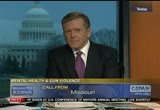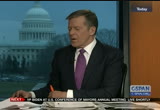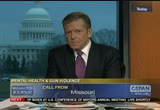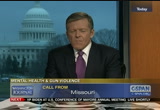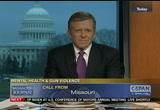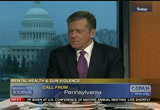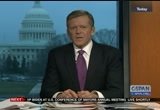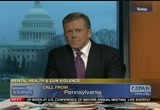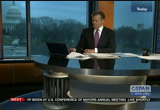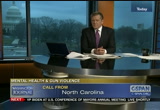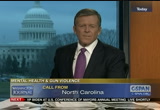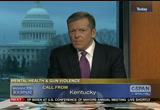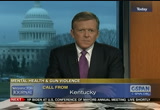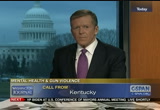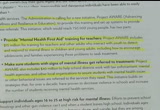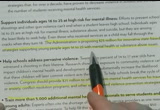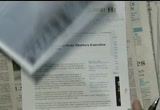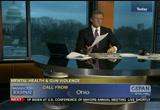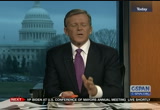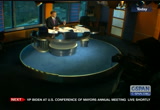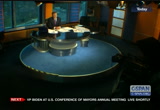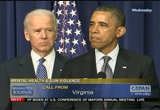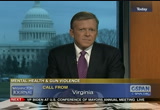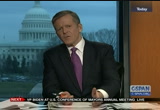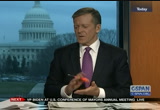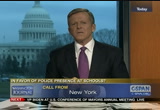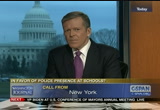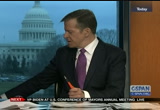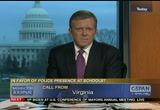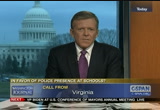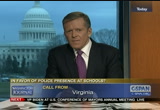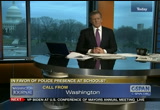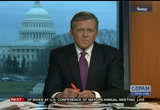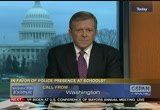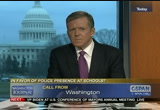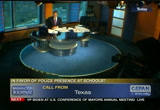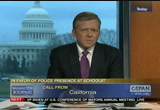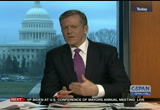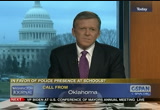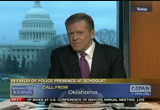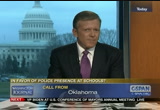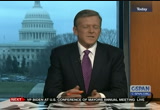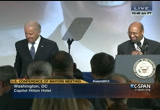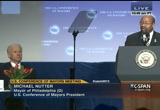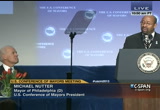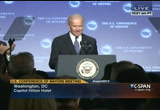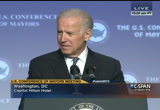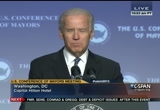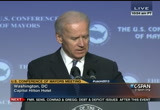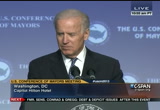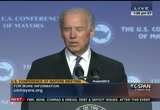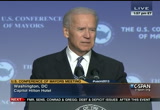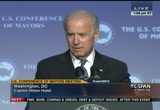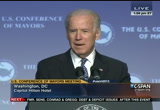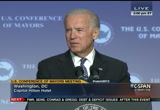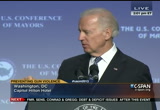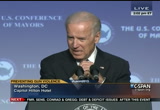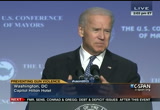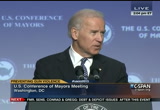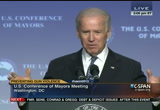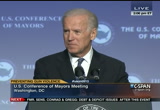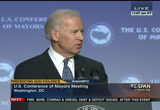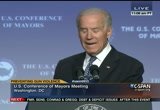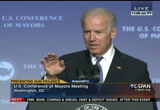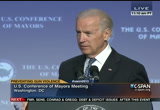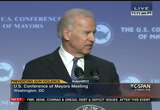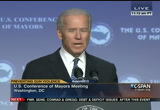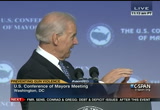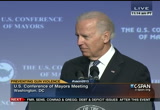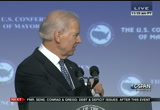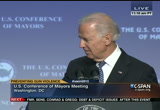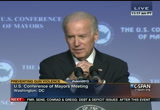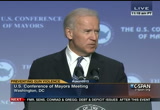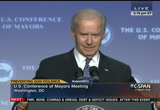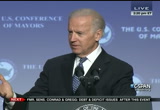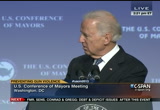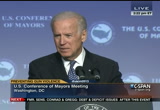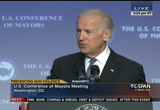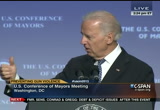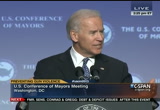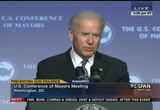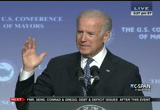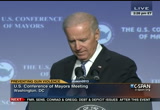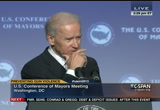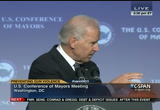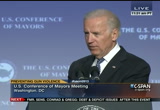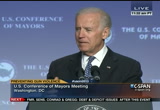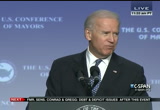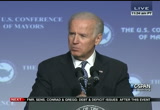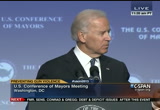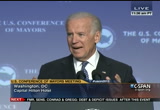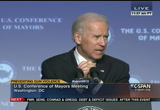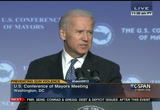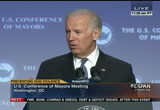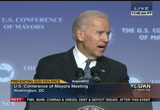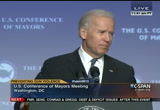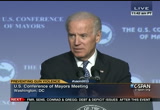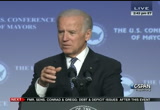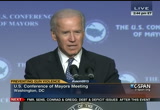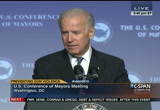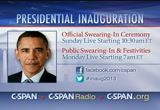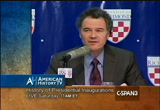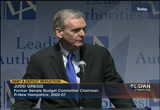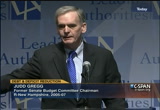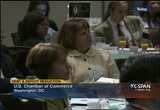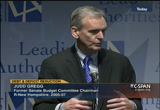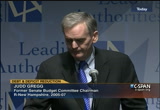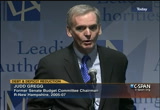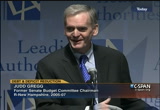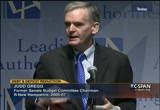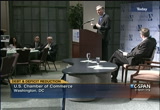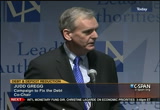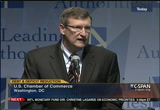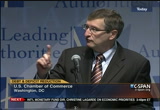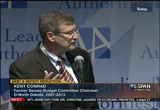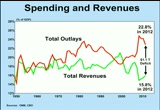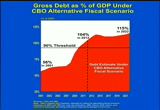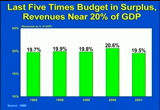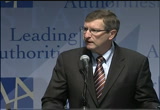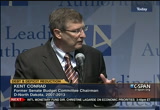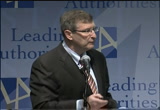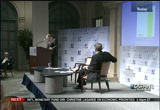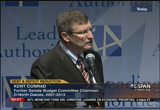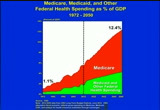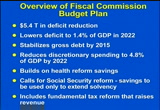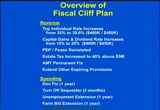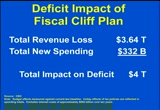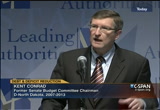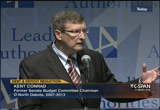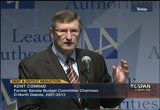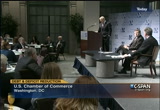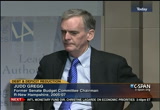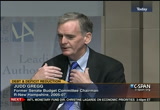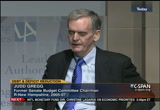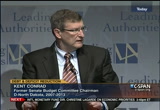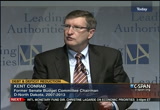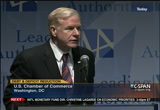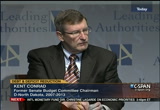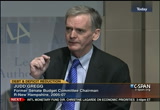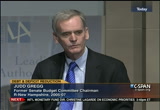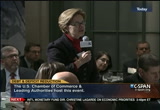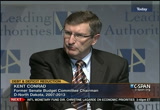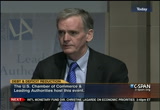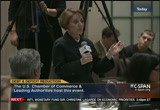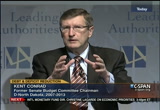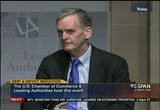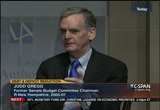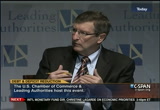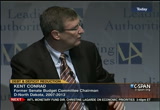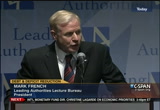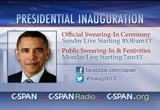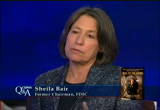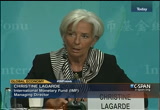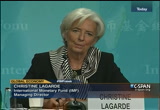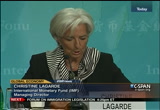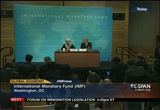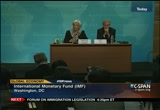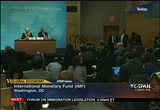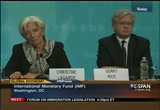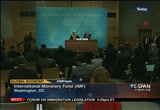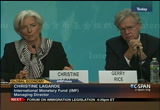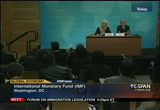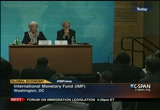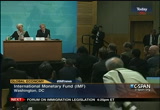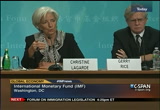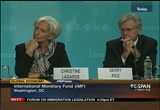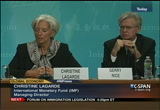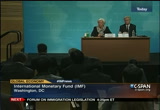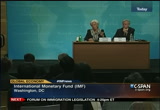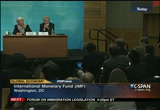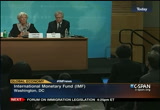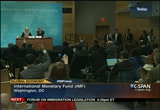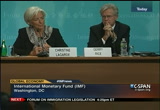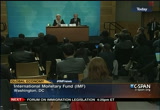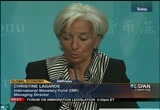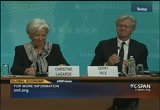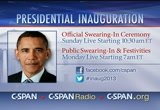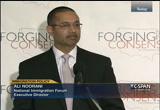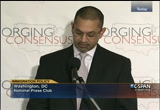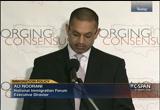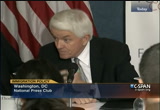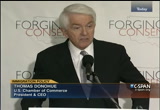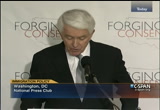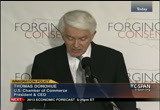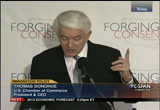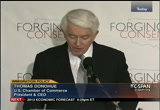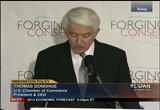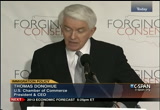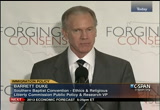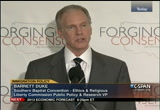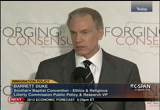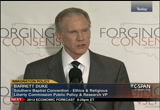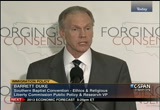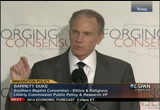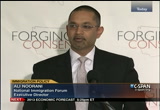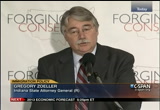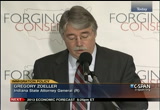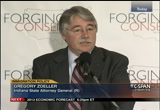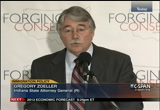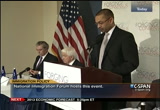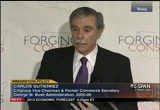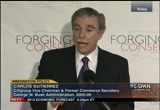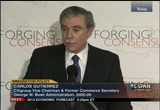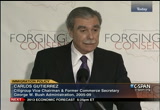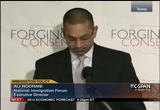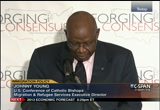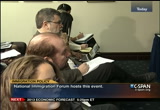tv Public Affairs CSPAN January 17, 2013 1:00pm-5:00pm EST
1:00 pm
go down the road at 100 miles per hour. we have stop signs, we have speed limits. i mean, we've been regulated driving a car probably over 50, 60 years. and i think if we start taking it from that attitude, the protection of society an everybody on both sides understands that it's more than a right thing, it's really protecting the community and those involved. . if you want to race a car, go to a race track. if you shoot a gun, go to a range. but you have to have it regulated and have to have people -- you just can't go out and have a gun or take a car and drive it any way you want to do it. host: why did you have a gun shoved in your face? caller: i came home from work and i was checking out a back yard and saw a kid stick his
1:01 pm
head out the window and i thought it was unusual because the guys next door was doctor and i thought something was unusual and i walked out the front door and saw this kid walking down the street and i noticed he was carrying something and i approached him and i said what are you doing? he said nothing. i said where did you get that gun? i got it from the old man. i said i know this man. next thing i know, the kid stops and he starts to run. well, i chased him and i started chasing him and he threw the gun down and reached out in his pocket and pulled out a .38 and pointed it straight at me. and i went oh. i said watch out! he said get on the ground!
1:02 pm
and he stood over me. he said i don't want to shoot you scloom my wife was watching and she called the police and the cops are on their way and you need to go. he said i don't want to kill you. i don't want to go prison. i said don't, run and get ut of here! he did, i went after him which was my fault. and the surprising thing was, when the police showed up, they said we are going on break and couldn't do anything about it. they knew who he was. and i have owned four bars and i have had confrontations and i have had people -- >> host: are you a gun owner? caller: no. i'm not against the right to bear arms. i have been hunting and i can shoot. i have done skeet shooting, but
1:03 pm
i take self-defense courses. and it's interesting that my teacher once said, you know you think you can stop them, but you can't stop a bullet. i know lots of people who own guns. it's a matter of self-defense. but, you know -- host: as a bar owner, have you seen incidents where the use of alcohol and firearms can be a dangerous -- caller: i have a guy walk into the bar with a gun strapped to his leg. he said you can't wear that in here. he said, i know. i said, you know, take the gun and leave. the thing i was worried about was someone getting drunk and a
1:04 pm
fight breaking out and somebody grabbing that gun. he said it's my right. i said great, take it. and we called the cops and they showed up. and they said well, was it a big gun? i said yeah, it was a big gun. what did you want me to do? i have had rifles shoved in my face. host: thanks for your time. calling from harrisburg, pennsylvania, psychiatric nurse. give us a little bit of your experience and mental health aspects on the proposals. caller: i think this is a really good discussion. i'm very concerned about the mental health aspect of this whole thing because we are getting lost in talking about features of guns and what concerns me in most of these
1:05 pm
mass shootings, what you have apparently when you look into it is people that try to even get help, some parents try to get help for some of these people who committed some of these horrible crimes and couldn't. we have a really big problem in this country with access to mental health care and especially those people who may pose a risk. when -- and i even think, just let alone not guns, megan's law and the man who tortured and killed her, his parents tried to get help for him and they couldn't. and a lot of this goes back to the 1980's, when we looked at rights for the mentally ill and i believe they should have rights to refuse treatment, but if you suffer from an illness -- i'll give you example, most of the mentally ills do not pose a
1:06 pm
hazard to people but certain elements do. and you cannot make these people take their medication and then we shut down the institutions and put people out in the street for community care. and these are the types of people that when they get into delusions, they are not going to come in and seek that care. so you have problems. you also have problems -- the school shooting in newtown is terrible, but i would like to know what went on in that home. what went on with mr. lanza and his mother? there's not enough information out there yet. and we're going off proposing this ban and that ban and whatever, all i see is that mental illness and care for the mentally ill seems to be getting short changed. the other point i'm concerned
1:07 pm
about is universal background checks. i will tell you i am a gun owner and a shooter. i own black powder guns and i own modern firearms. i do believe in universal checks. when you are talking about mental illness, what questions are you going to ask? they are pretty vague about that and what happens when you have someone who is taking care of depression, which millions of people suffer from. are you going to ban someone's ability to own a firearm on the basis of them suffering from a depression and what information is the mental health professional going to be giving. host: did you hear the caller br before we started the segment, the caller who was worried about himself and his own p.t.s.d.? >> i think that he definitely is
1:08 pm
someone -- this is just off of his -- he is concerned about his firearms and i hope he has discussion with his family and they would encourage him to not have those firearms in his home. but i think he is most likely to use them on himself, but he does have the anger problem, but i hope that families with mentally ill people in the home get into this. i kept guns for a friend of mine who had children with disturbances, abusive situation and i kept those firearms in my home, because i had no depend events and locked them away until the kids finished therapy, grew up and are now out of the home. everyone has to have the personal responsibility to look into their own families. and to see what's going on. and i sure as heck would like to
1:09 pm
know about mr. lanza, newtown shooter. his mother took him out of school and home schooled, but we aren't hearing anything why. and why didn't people ask questions. where was the rest of the family in this? host: tweet from chris jones, there are many forms of mental illness, very few likely to be violent and many who are violent have no diagnosable illness. caller: you hit the nail on the head looking at mental health issues.
1:10 pm
and i was always trained that guns are never pointed at anybody. we live in a society today where they have gangs -- games where people shoot one another with guns and we have not only those places where they go and take hands-on guns, but they are de sense advertising these people. and i never pointed a gun at anybody. so right now, we have children that are being exposed to these violent video games and i'm a firm believer in the psychological period. as we take these children and allow them to be free to take on these games and then to see the blood plattered and they get fearless. you take a person who points a gun at somebody, it takes away
1:11 pm
any reservation of them to take violence out against. these people that respond, apparently, they have been angered by someone. this guy that did this, he had a mom that took him out and shotguns with him. and he just for some reason or another, he got mad at somebody. and in the world we live in today, you always have somebody trying to do something to make you mad. and you just can't respond with violence like that. so i think -- i'm sorry i didn't get to hear the president's speech yesterday. i work the night shift. and i listen to you guys every day when i come home from work. i like to stay abreast of what's happening in the political world and the economy which we're in. the situation with the gun
1:12 pm
violence is very close to home, because i do enjoy -- even though i'm 60, i still go out and hunt and shoot a deer and kill a turkey to eat. host: thank you very much. by the way, the full presentation by the president yesterday, you can certainly watch atlanta cspan.org. good morning, what kind of work do you do? caller: i'm in the mental health field. each level of the patients have had different mental health issues. and i have really been waiting for this issue to come up, because that's what concerns me the most. i have worked with people that
1:13 pm
have multiple personalities. we have been scared to death. they pick beds up. they have tremendous anger in there. i don't think they get the proper care that they need. and after a while, they're released and that is something that i'm really concerned with. it's not about who is able to get a gun, who is able to have a gun. that's not the issue right here. the issue is that we have to start dealing with people with mental health issues. i have worked in a vietnam hospital. i have worked with people with ptsd. one guy on the floor, he wabdel weighed 120 pounds soaking wet and had 10 personalities. and no one could stop him.
1:14 pm
and i cannot imagine that guy being out on the streets and able to carry a gun. and if -- host: do you know if he was a gun owner? caller: not in this facility. and i'm for sure that he had been was able to have one, i'm sure if he was out, he could be perfectly normal but go into one of his personalities and we need to address this issue and forget about sports shooting and really get to the bottom and address mental health issues within the family and see where it passes down the line because i have noticed that is one of the causes. host: thank you. this morning, mike in ohio, independent line. go ahead. caller: he never resorts to his
1:15 pm
weapon unless his family got a weapon pointed at him. and we have the castle law in ohio. we have small communities and drive 20 miles or more to get to a town of substantial people. therefore, we have to protect ourselves, because the law, it takes them 20 minutes for them to get to your house. that's why they should deal with these mental cases so we don't have to worry about them coming in our house and trying to harm us. that's the main thing right there that has to be dealt with. just them running the streets
1:16 pm
rampant and the games like that one gentleman was saying, we have kids around here who could careless, kicking dogs and cats. you know what i mean? to me that's what the games are doing to them. host: we'll leave your comments stand there. back to the president's plan. here's the front cover. now is the time, go to white house.org but some of the money aspects. the administration is calling calling for a new initiative, project aware, advancing wellness and resilience in education to provide training and set up systems to provide referrals and reach 150,000 young people. number one, provide mental health first aid training for teachers. project aware includes $15
1:17 pm
million for training for teachers and other adults who interact with youth to detect and respond to mental illness in children and young adults and make sure students with signs of mental illness get referred to treatment. project aware also includes $40 million to help school districts work with law enforcement, mental health agencies to ensure that behavioral issues are referred to the services they need. another item in project aware, support individuals ages 16 to 25 at high risk for mental illness. the administration is proposing $25 million for innovative state-based strategies supporting young people ages 16 to 25 with mental health or substance abuse issues. help schools address pervasive violence. congress should provide $25
1:18 pm
million to offer students mental health services for trauma, conflict resolution programs and other school-based violence prevention strategies and train 5,000 additional mental health professionals to serve students and young adults. experts cite the shortage of mental health service providers to gill this gape. the administration is proposing $50 million to train mental health professionals. this again is the report issued by the president and the vice president, his team that put together now is the time again. the president and the white house are using the hash tag on now is the time on twitter to get out their promotion for their idea. politico poll, new gun laws won't stop violence.
1:19 pm
americans don't think a new wave of gun laws will prevent future mass shootings. only 39% of americans think the new laws would stop gun violence. compared to 61% who think it will continue. next call is dan in ohio on our democrats' line. dan, we are talking about some of the mental health aspects, what are your thoughts? carl carl all these people -- caller: all these people who are paranoid to think the government is going to take their guns, they probably use a psychological evaluation. if the government wants to take your guns and your assault weapon isn't going to stop them from doing that. a second opinion is, i hear everyone talk about regulating and background checks on
1:20 pm
handguns, but what about background checks on ammunition and that would cut back criminals. host: i appreciate your time. mental health issue must be handled very carefully. a counselor and nurse should be on every public school site, not guns. and joseph asked, should ptsd prevent owning a firearm. rick on our republican line. what are your thoughts? caller: i appreciate you taking my call. i am a republican, i'm a gun owner, former n.r.a. member and i'm also treated for depression. host: why a former n.r.a. member? caller: the day after the presidential election, i was
1:21 pm
contacted by the n.r.a. -- if you know anything about the n.r.a., if you are a member, they do contact you quite often, mail, via phone calls, asking for money. and more money. and while i still support the n.r.a.'s positions on defending some of our rights, i also saw them as one of the largest and most powerful lobbies and the fact that they couldn't defeat president obama, at that point, i'm not throwing good money after bad, and i just decided that i wasn't going to support their financial effort anymore. host: i abottle guise for interrupting. you are a gun owner and treated for depression. caller: i am trited for
1:22 pm
depression and i haven't read the president's entire proposal veer bait im, but i just want to caution the government to take a look at this -- first of all, as a man, i'm going to tell you it's difficult for me to go to a health care professional to ever address my profession. i knew for years i was depressed, but i thought it was something i could man up, power through, get through, take care of myself and not the case. my doctor actually told me that it's a physical thing, a chemical thing, biological thing. you almost have to look at it, someone who has cancer, and i apologize to those who suffer from cancer, but you can't just think away cancer. you just can't hope away cancer.
1:23 pm
you have to deal with it. it's the same way with this kind of depression. so my point is, depending on how far we looked at these mental health aspects of having a gun and being a gun owner, my caution is is that, let's not go so far to people who have depression not want to get treated or stop being treated because of the fear of, you know, not being able to have a gun. here's the thing. i don't hunt. the last thing i ever want to do is use a gun on another human being. i do have guns for self-defense. i like to sport shoot, too. i live in the country. but if i had to ever use the gun in self-defense, that would be a very, very burden on me and not something i can even say how i
1:24 pm
would react. until you are in that fox hole, you can't say yes, i would do that. host: prior to getting treated, do you think you were ever in danger of having a gun to yourself or anybody else? caller: knows, i'm not suicidal and haven't been suicidal and again, i'll reiterate. i look to hurt anybody or want to hurt anybody. when the sandy hook tragedy happened and i saw it on the news, my heart was broken, no more, no less than the amish school shooting, columbine or aurora. i think they are all tragic and hurts me. i hate to see people do that to each other. but, no, no, i have never seen myself as a danger to myself or to others and my doctor, my
1:25 pm
mental health professional said the same thing. i'm forth coming and i'm honest. that's it. host: we appreciate your story and your time very much this morning on "the journal." . chris in virginia will be our last call on mental health and gun violence. chris, hang on for just one second and going to show you the new lines. we'll keep chris on the air. but for this last half hour in our discussion about the president's gun control proposals, your reaction, we want to hear about the issue of police presence in schools. are you in favor of that. what do you think about increasing the police presence. the n.r.a. has called for armed guards at schools or carrying laws for teachers, we want to know about increased security or
1:26 pm
police presence at schools. we have divided our lines differently. students, call in. and for parents, call in. and finally school teachers, administrators, we set aside a line for you. so if you could call in on those lines, we'll begin taking those calls in a minute. chris in virginia. thanks for holding, what do you think about mental health and gun violence? caller: i'm the rights guy and i'm being treated as being depressed. and it concerns me that the way the government is working and the way that obama has signed executive orders, i mean concern
1:27 pm
is what stipulations would mental health fall under to ensure safer gun policies that would be harder to register for a weapon like say if i was depressed for a week or couple of weeks, would that hinder me from being able to get a firearm or not? i haven't read all of the -- like the last guy that was talking, i haven't read all of the 23 executive orders, but as a citizen of america, i do want to be able to partake in the rights and freedoms that are offered. host: are you currently a gun owner? caller: i'm pursuing owning a firearm, yes. host: does the fact that you are treated for depression, first of
1:28 pm
all, does that come up in any check? and does that worry you at all? host: it worries me on a level that if i'm being treated, if it would stop me from being a gun owner, because i'm not suicidal by no means nor am i homicidal by no stretch or measure. and to be treated for depression and have the government look at you like you could be a harm i think is lunacy. there are certain mental aspects of different people that have different issues that i do believe could be looked at as dangerous and harmful to others, but i, myself, since the
1:29 pm
shooting of newtown, which was a tragedy, any time you have a shooting like that, it's a tragedy and it's not necessarily the weapon's fault behind the shooting or the incident. it's mostly the people and their emotional problems and their neglect to get help to solve their issues and to come to terms on how to be treated for them. but my concern is being a citizen and establishing myself as a gun owner and establishing myself as soon to be a member of the n.r.a. and the virginia defense commission -- host: you were pursuing gun ownership. has the fact that your treatment for depression -- has that played in any of the background checks or anything?
1:30 pm
caller: not currently. i believe it will be brought up, but as of what i know right now, i don't believe it will be. but if it does get brought up, i would be ok with it, just for the fact that i do think background checks are necessary to keep law-abiding citizens, the weapons in their hands and to keep criminals, the background checks, to keep the guns and weapons out of the criminal's hand. host: thank you for your time this morning. little less than 25 minutes left in "the journal," and we want to turn to the police presence at schools and whether or not you support that increased effort. we have divided the lines for
1:31 pm
this last effort, parents, students, school officials, teachers. and we will begin with student justin in new york. justin, where do you go to school? justin, you with us? >> yes, i am. >> where do you go to school, justin? >> i'm a college student. >> where do you go to college. caller: i'm a liberal arts, criminal justice. host: what kind of security do you have? caller: a police officer in the school now. host: is this a police officer -- caller: auburn police officer. auburn police officer goes there and they spend -- will have one or two cops there all day. host: all day? caller: yes. host: what do you think about
1:32 pm
increasing security presence? caller: i'm against a police state. any time, any first thing that the government does, it's always the first step and how much longer before the police start -- the government starts to realize this power it has and has police officers frisking kids just because. how much longer before our fourth amendment rights are destroyed by this. host: have you witnessed that? has that happened at your school? caller: not yet. but it hasn't happened yet. the right of the people to keep and bear arms, why is it the teachers can't have guns. and students at colleges have pistol permits, they should be allowed to bring their guns to school. host: you are studying criminal justice, which means you want to be a law enforcement officer,
1:33 pm
what? caller: something along those lines. eventually, someday, i would like to be dwsh everyone thinks it's crazy, but i want to be in the house of representatives. host: new laws have been passed in new york, governor cuomo signed mental health aspects if. do you believe in concealed carry? caller: yes. host: are you allowed to do that as a student in new york? caller: we can conceal carry but not to the school. host: are you a permit holder? caller: i just have a shotgun. host: michael is a parent in norfolk, virginia. what do you think about all this .
1:34 pm
increased security in school. caller: i'm the parent of a six-year-old here in norfolk, virginia. it's tough all the way around. no, i don't think that it would make too much difference. as far as being a parent, yes. it would probably make the parents a little bit more secure as far as when they bring the children to school. seeing that the incident happened in a couple of weeks ago, it makes people a bit jittery. but the whole key to it all is responsibility. we as parents have to start -- starts with us and doesn't start with the n.r.a. or congress, does not start with president obama, even though we have individuals that want to pass the book and blame other individuals. it starts with the parents. we have to sit down with children and let them know, make
1:35 pm
them feel safe first and foremost and then go about explaining to them, ok, this is a firearm. unfortunately, you have to go with a lot of people these days, you have to go straight down the line with them and explain to them one by one what their responsibility is. however, if that needs to be done, it starts with the parent. host: michael, are you a firearm owner? caller: i am not. i have family members who do have firearms. and i have seen over the years -- the things that can happen with irresponsible people and firearms. it happens every single day. we have no control over that. but what i do have control over is i can explain to my son that things happen in life, no,
1:36 pm
there's nothing good that happened a couple weeks ago, however, we are the freest nation on the face of this earth, and if we don't be responsible and explain to our children, the people around us, things like this will happen. host: michael, how much of what happened at sandy hook filtered down to your six-year-old? caller: the day i went to go pick him up, i have to say, if you're not a parent -- even if you are a parent and you saw what happened and you went to go pick your child up, me, personally, walking to the school, you always have it in the back of your mind or at least i did have it in the back of my mind and makes you think, what could happen. could be thinking about doing things like this. it made go on with the rest of my day. however, i did think about the
1:37 pm
repercussions of what happened. like i say, it's a very, very tough issue all the way around and once again it's just responsibility. we all have to be responsible. that's where it starts. host: michael in norfolk, virginia. barbara is a retired teacher in sumner, washington. good morning. caller: good morning, peter, and thank you for c-span. i'm still in education and i visit a lot of schools still with contracts, although i'm not in my own classroom. i would love and appreciate police presence. we go into these schools and we haven't been there before and don't know the situation. when i see a security officer or a police officer around the school, i feel very comforted. and i would like to see that in all the schools really. host: how many of the schools do you see that in, barbara?
1:38 pm
caller: handful. host: why at those schools, do you know? caller: mostly the upper grades and urban schools that have the security. host: what would you think of a teacher or a principal caring concealed? caller: i don't like that idea. i would never consider carrying a gun myself. i think if people were going to do that, it should be people who have been strained like former police officers or former military who are now teaching in the schools in some other capacity. i would never consider doing it myself and i'm terrified of them myself. but i think having the police officers around would definitely boost students' respect for police officers and the law. and maybe they hear other messages at home. i know they hear that in the media, you know, the movies and
1:39 pm
kids' shows and all that. thank you. host: joshua is a student from kent, washington. good morning. where do you go to school, what are you studying, what do you think about increased police presence in your school? caller: i go to community college and i actually studying to become an engineer. and my thoughts of having protection in the schools is a pretty highly thought. i think, though, with people that are carrying firearms in our schools should have -- how can i say -- intense training and making sure that they go through intense backgrounds themselves, because the people that are around them are students and children and there's a lot of responsibility
1:40 pm
in that area of school. so it's definitely important that they -- the people that are carrying a firearm amongst the school have to be aware that firearms are still out on the side of their hips. people walk by them. a lot of training has to be involved. host: what kind of security presence -- you say you go to shoreline community college? caller: yes. host: what kind of security presence is there? caller: they have security guards that drive throughout the school. i have not seen any of them with a firearm. i think they carry mace or something like that. but they travel throughout the school in the outskirts, the perimeters of the school. host: mike in san antonio,
1:41 pm
texas, on our parents' line, what do you think about this conversation, mike? caller: thank you for c-span. you do a wonderful job. it seems to me if there would have been a trained guard at sandy hook, it wouldn't have happened at all. we have 100,000 guys coming from the service that have been trained in firearms, why not make them guards in 50,000 schools, two guards in schools. that would be a good thing. host: as a parent, you would feel better about having more security? caller: yes. my son is about 30 years old, but it would make me feel better. seems like some insane person who wants to get into the school wouldn't get in there if there was a trained guard at the door. every one of these cases there has been a shooting, has been an insane individual. seems like a good plan to me.
1:42 pm
host: a teacher from california. south from riverside. l.a. area? caller: riverside county. host: what do you think about increased police security at schools. caller: i teach in an elementary school and i think in an elementary school, it would be better to have a communityly aceon that helps people with mental health issues. in my experience, i'm trying to get help for children and medical isn't treating people with mental illness and doesn't give them appointments or give them an appointment they can't keep.
1:43 pm
if they see a neurologist, they say this is an adult neurologist and give the people the run-around and not getting the help they need. mental health at the elementary age is very necessary. host: do you feel secure in your school? are there procedures for getting in and out of the building? caller: we have procedures and we practice drills on a schedule. and yes, i feel very secure. my school is very well run, but i can understand people at a high school or middle school perhaps not feeling secure. host: after sandy hook and that was an elementary school, did it go through your mind at all, man, if i had just been carrying or the principal had been carrying or police at the front door? caller: i keep in contact with
1:44 pm
my students and families and my principal. i feel very secure. host: ethan in welling, oklahoma, on our students' line. tell us your story and make your comment. caller: my name is ethan. i believe that policemen at our school should not happen, a teacher should be able to own or carry his her own weapon after an extensive background check and he should be able to be in training for more than four hours in firearm handling. a person should be able to actually -- a teacher -- i'm
1:45 pm
sorry, i haven't really corrected myself. host: you are doing fine. let me ask you a couple quick questions. where do you go to school, household are you, what are you studying, et cetera? caller: i'm home schooled and 15 years old and why i'm home schooled is not being protected, not because i'm scared of the world. i'm taking college courses right now. i'm taking college french, college math and stuff like that. host: do you have any activities at the school at this point, social activities? caller: i have had my fair share of public school. i was taken out by my parents because i scored off the charts for reasoning. for what was taken at fourth grade, i have been in a steady
1:46 pm
uprising of what i have been able to do. and again for a very long time, ever since i know from pre-school, a friend who is right now in high school, one year behind me, he's a freshman at high school, and i'm doing higher math than what he was doing at his high school right now. host: congratulations on that. so you would support a concealed carry for teachers or principal or some school officials, correct? caller: yes. as long as they have been -- as long as they have had extensive psychiatric background. if they have any sort of depression, aggressive behaviors, any sort of tendency towards violence, i would not
1:47 pm
like them to have a gun, because if they have any hostility to any particular student or any group of students, i would not want them to have a gun. but i do believe we should have a couple guards, but not armed guards, having a bunch of armed policemen makes you feel like you are in a prison. host: ethan, thank you for your time and good luck in your studies. thanks for watching "washington journal." we have alan on our parents' line. what do you think about increased security and police presence and armed security at schools? caller: i think we should have that as a matter of fact, the day after we had the sandy
1:48 pm
shooting, the school that my daughter attends had an actual bomb threat. and it was to the point where parents were running out there -- >> we'll take you live now to the u.s. conference of mayors' winter meeting. vice president joe biden will speak to the group just getting under way here live on c-span. [applause] >> mayors and ladies and gentlemen. it is, of course, my distinct
1:49 pm
honor and pleasure to have the opportunity to introduce our good friend and my good friend, vice president joe biden. throughout his career as a public servant, vice president biden has championed issues that are critical to the prosperity and growth of america's cities, and he has engaged directly with the u.s. conference of mayors on a regular basis. during our annual meeting this past june in orlando, vice president biden pledged that the obama administration would make sure that future infrastructure investments are more targeted to local areas. in november, last year, the vice president hosted our leadership in the white house to discuss the fiscal cliff and the concerns of mayors regarding both investment programs and tax-exempt financing. whenever there's a major issue that demands attention, again and again and again, vice
1:50 pm
president joe biden has shown the leadership and courage needed to help move our nation in the right direction. and that is why i was certainly hartened when president obama asked vice president biden to lead a special task force to develop responses to the tragedy not only at sandy hook elementary school, but the daily tragedies we see all across america. the nation's mayors and vice president biden have stood together for many, many years in support of public safety. after all, it was then-senator joe biden who championed the crime bill, which established the cops program and included the ban on assault weapons and large-capacity magazines, which congress unfortunately, allowed to expire. yesterday, i was personally very proud to be in the white house as president obama and vice president biden unveiled a strong, comprehensive package of
1:51 pm
legislative and regulatory reforms needed to response to the ongoing gun violence in america's cities and suburbs. every day america's mayors see the carnage caused by illegal guns and assault weapons that have no place on our nation's streets. working with president obama, vice president biden and the congress, we will make sure that the changes that are needed to protect our children are made. ladies and gentlemen, u.s. conference of mayors, welcome back our great friend, vice president joe biden. [applause] >> thank you very much. please, please be seated. thank you all very, very much. an honor to be back with you. i would like to begin by acknowledging two folks from
1:52 pm
delaware who are here who are engaged in this subject as well. one i have known for years and years. he is now our new mayor, dennis williams, i don't know where you are out there, but welcome to the conference, old buddy. great to have you. and dennis and i go back to the days when we were writing the crime bill when dennis was a police officer in the city of wilmington and also the chief law enforcement of delaware is here that i have known even longer. we share the same last name, the attorney general of the state of delaware, by son beaux and i do whatever he says because he has the power to indict. [laughter] >> all kidding aside, i'm proud of my home state as we used to say in the senate, point of personal privilege, the progress they are making, efforts they are making under the leadership
1:53 pm
of our governor on the very subject you talked about. and i say to dennis, mayor williams, forgive me, i'm so used to referring to the mayor of philadelphia as my mayor because i spent about half my life in philadelphia and my granddaughter resides in the city limits, i want to be particularly good. my daughter is also a voter there as well. so i have to be particularly on good behavior. ladies and gentlemen, it's a pleasure to be back. i look forward to this opportunity every chance i get from the time i was a young fellow and new to the united states senate. it's one of the groups with whom i have had a relationship with for a long, long time and nice to be with a group of people who you agree with on all of the issues 90% of the time. so it's nice to be with you. i know you have come to talk about a broad range of very
1:54 pm
important, challenging issues that are facing each of your cities and towns, energy, infrastructure, budgets, finances, crime. and i want you to know that we, the president and i, and the important part of that is the president, continues to be absolutely committed to do all we can to help the cities deal with the immense problems that get thrust upon them as a consequence of diminished tax bases, as a consequence of housing, a significant portion of the public and the states that are in the most need. we are committed to having a third phase of the so-called big deal in the budget. we're of the view that just as it took during the clinton administration, it didn't happen in one fell swoop. the economy in great shape and
1:55 pm
move toward a balanced budget. it started off in three phases. it started off with president bush's actions, the first president bush in terms of taxation before president clinton took office. and then the actions the president took in 1994 and then in 1997. well, we think there is a third phase here that can set our country on a path that will allow us to get our debt to g.d.p., our deficit to g.d.p. down around 3%, which is the basis of all economists left, right and septemberer all agree on the areas we can begin to grow as a country. and as my grandfather used to say with grace of god and goodwill of the neighbors, cooler heads will prevail now between now and the time we deal with the debt ceiling and we may meet the goal which we set out to do, which is to have roughly
1:56 pm
a $4 trillion cut over 10 years in the long-term deficit and to put us on that path. but i didn't come here to talk about any of those important subjects today, because as important as they allr today we have a more urgent and immediate call and that is how to deal with the epidemic of gun violence in america. you all know the statistics better than anyone so i'm not going to repeat them. on that score, i owe an incredible debt of gratitude to you at the head table and those of you in the room. i know we don't have you nan hit in this ballroom nor do we in any ballroom, but we all acknowledge that we have to do something. we have to act. and i hope we all agree, there is a need to respond to the carnage on our streets and in our schools.
1:57 pm
i hope we all agree that mass shootings like the one we witnessed in newtown 34 days ago cannot be continued to be tolerated. that tragedy has affected the public in a way i have never seen before. the image of first graders, not only shot, but riddled with bullets. parents in the streets panicking, trying to find out if the child they put on the bus in the morning had any prospect of going back on the bus and going back home that afternoon. for 20 of those parents, the answer is no and i believe as i'm sure you do, we have an obligation to respond intelligently to that crisis. and i know many of you feel the same way. i have had the occasion to talk to a number of you and i wanted to start by thanking all of you,
1:58 pm
including mayor bloomberg, who is not here today, although i spoke to him on the phone. thank you for your input and incite. again, not all agree on what should be done. but you have probably more than any group of elected officials thought about this issue more intently and longer. you have done a great deal of work on this. all of you who deal with the issue every day. i'm not going to ask for a show of hands, but if i did, a lot of people would put their hands up in this room. how many of you mayors attended the funeral of a police officer or an innocent child in a drive-by shooting or shop owner in your city? many of you, many of you have had to attend and many of you, many, many funerals. some of your communities experienced mass shootings, not just in schools, but movie theaters and temples and not
1:59 pm
unique to big cities. it was -- i happened to be literally, probably turned out to be a quarter of a mile back in 2006 at an outing when i heard gunshots in the woods that we didn't know where we thought there were hunters. i got back to the clubhouse in this outing and saw helicopters. it was a shooting that had just taken place in a small amish school just outside of lancaster, pennsylvania. so it's not just big cities or well-to-do suburbs. it can happen anywhere.can happ. i also know it is not just about match shootings. as my friend michael knows, and as my mayor knows, the murder rates in both the our towns are
2:00 pm
beyond what is well remotely tolerable for a civilized circumstance. it is not just about mass shootings, but gun violence of all kinds. over the past several years, 25 people died of gun-related homicides in this country every single day. every day. which is the equivalent of the third most deadly mass shooting in history happening every 24 hours in this country. as much as we intend on making schools the focus, making them more secure. as mayor emanuel of chicago said, the truth is most schools are safe. it is going to and from school when young people are in the greatest danger.
2:01 pm
we do not see that on the news very much anymore. we hear about mass shootings, but not every day gun violence as ravaging our cities. i remember my friend. i always looked up to him at and consider him a friend, then your patrick predicted a patrick moynihan. when we were trying to get through the bite and crime bills -- biden cribme bill, we were all on the floor debating this issue, and patrick told the story of a valentine's day massacre in 1929, and how shocked the world when seven gangsters were gunned down in cold blood. it made the front page of every major paper in the nation and many around the world.
2:02 pm
but then he said, in 1992 with when a woman saved her baby from execution by hiding that baby under the bed, but she was shot and killed, along with her husband and teenage son, that story, and he took out "the new york times" took up the second section. it was not front-page news. it was barely news at all. i will never forget what he said. he said i call that defining deviancy down. how it was not even news. if that had happened in 1929, it would have been astonishing. well, folks, we can no longer continue to define deviancy
2:03 pm
down. we cannot wait any longer to take action. the time has come. as you know, this week i delivered a set of recommendations to president obama on how we can better protect americans from gun violence. i have been getting credit and blame for that, as if these were original ideas of mind. i want to make it clear, what the only power influence of vice-president has is reflected power. none of it matters, no matter what someone tries to give you credit for. if it were not for the leadership of the present united states, the president of the united states. i am his agent, but this is the president of the united states. he asked me to go back because of my years of experience in judiciary committee in dealing with these issues, he asked me
2:04 pm
to go back and do as quick of a survey as i could, as the row as i could in a short time frame and present him with a set of recommendations. i have the incredible help of some really first-rate cabinet manners -- members, starting with the attorney-general, secretary of education and homeland security, secretary of health and human services. and we met with a range of 229 groups. representing a wide range prospectus. from members of the law enforcement community, including many from your cities and states, to gun safety advocates, victims of the shootings, both down in virginia, as well as in colorado. sportsmen's organizations, hunters, gun owners, the nra. representatives of the video game and movie industries, educators, retailers, and public
2:05 pm
health officials. and as i said, i spoke to many of you in this room as well, along with the governors and the county executives. no group was more consequential and instrumental in shaping of the document we put together that all of you in this room. those conversations, after literally hundreds of hours of work and research done by experts at the justice department and department of homeland security and elsewhere, after hearing just about every idea that had been written up only to gather dust on the shelf of some agency in government, a set of principles emerge that there was not universal agreement on, but overwhelming consensus on. they were the foundation of the recommendations. if you will permit me another 10-12 minutes, i want to lay out to you what they are from
2:06 pm
the perspective of the president andy. the first foundational principles is there is a second amendment. -- from the perspective of the president and me. it comes with the right of law- abiding responsible since it citizens who own guns. the second foundational principles, certain people in society should not and can be disqualified from being able to own a gun because they are unstable or they are dangerous. they are not the citizens. but the vast majority of gun owners comprise. 3, we should make common sense judgments about keeping dangerous weapons off of our streets.
2:07 pm
clearly within the purview of the government, at the same time recognizing, honoring, and being compliant with the second amendment. not just about guns. it is about our culture. whether it is with video games, movies, or behavior. it is about the ability to access mental health services and the safety of our schools. it is a very complex problem, and it requires a complex solution. and based on these principles, and a vast array of groups and experts, we put together a comprehensive plan based on a common-sense approach where i believe, from heading this group, there really is overwhelming consensus.
2:08 pm
there are disagreements in degree, but the consensus on the principles i have laid out. we asked a number of questions. by the way, we recognize how different oliver states and cities are. how different the gun culture is, held the gun culture in rural america than in urban america. how different the gun culture is in states that are overwhelming -- my home state of delaware. most of you probably do not realize, we of the highest per capita cohn -- gun ownership because of the accounting, the amazing tributaries that go from the delaware bay, chesapeake bay, and the various rivers that flow into the bay. it is a paradise for hunters. it is a big business, as well as institutional. it is culture. i remember all woman from
2:09 pm
delaware, the reason i got elected to the senate. she said now joey, i want to show you something my dad gave me. this was a woman who was 78 years old. she walked out in the backyard and said you know, it is the season now, right now. she said it is goose season. do not get mad. she walks into her den, takes a shot gun all over the fireplace. i walked out and she says my daddy told me how to steady aim, and i want a lot. did that in the upper east side of manhattan, you have a problem. but it is really important, because some of you who share very strong feelings about gun control. i think it is important to understand the ethic were a lot
2:10 pm
of us come from. but it is not this culture, the recognition of the differences in the cultural behavior and attitude. from arizona to new jersey. although south jersey, it is a big deal. my generic point is recognizing those differences does not in any way they get the rational prospect of being able to come up with common sense approaches or how to do with the myriad of problems that relate to gun ownership. who has that done? we asked a number of questions. the purse question we ask is who should be prohibited -- the first question is who should be prohibited from owning a gun? current law has evolved over time, and we have considered the question. my senior year in 1968
2:11 pm
graduating was an incredible year. the only political career i ever had, bobby kennedy was her -- assassinated two days before i walked across the stage for graduation. dr. king, the one who got week engaged in politics, was assassinated earlier that year. even assassination attempt at a george wallace. it is no wonder things held together quite frankly. well, the congress passed what was then called the gun control act. among other things it said that felons, fugitives, drug users, those who have been adjudicated and it is not a politically correct phrase, but it is in the law, those that are mentally affected could not own a gun. 1994 as a world change in country changed, along with the
2:12 pm
thing i am proud is for having written and passed about. we added a new category of people who were prohibited from purchasing a gun. based on facts, not on fiction. that is those who had a restraining order issued against them in a domestic violence incident. that was a fight to get that added. then, two years later we expanded the list again to include anyone convicted of a misdemeanor violent crime, because there was some history that they were the most likely people to do something. time and experience has demonstrated we continue to take a close look at the risk to see if it fits the needs of society at the moment. it is part of our recommendation to the president to suggest the president directing attorney general to study that question. people be added
2:13 pm
to the prohibited category? certain convicted stalkers can still purchase a gun. people with outstanding warrants, as long as you do not crossed the line into delaware, they can go buy a gun. people have been convicted of misdemeanors for abusing their children have now been added to the list. as all of you know, you deal with it every day. there is parental abuse for elderly parents. should they be prohibited? i am not making a judgment, but i am convinced we have to look at whether or not the prohibited category should be expanded. the most delicate area is the mental health area. this requires a great deal of study. this is where you find the pro- done guys to prohibit more and anti-than to say it is privacy. -- anti-gun guys to say it is
2:14 pm
privacy. these are the categories the present have the attorney general looked at. there is a second issue involved, and all of you know it. we have a thing called nix. it is a place in washington, d.c. it runs the background checks on people before they can buy guns if they are in the prohibited class. it is a little bit like if you ever have bought a gun, i purchased two shotguns, a 28 in 12 did shotgun. -- 20 gauge and 12 gauge shotgun. just like when you get a credit card, if the bank does not have on record exactly what you have in that account or not have in the account, then you have a problem. it is only as good as the information available. right now the information being
2:15 pm
put into that system is woefully incomplete. states are supposed to make mental health records available for people who cannot have the guns. today there are 17 states that have made fewer than 10 mental health records available on the background check system. 10. there are tens of thousands of felons the estimate is, who are convicted in your cities and states. that information is never transmitted to the system. so we recommend to the president that he redirect, because no one knows for sure whether or not it is an illogical judgment they are making or an economic issue. so we asked the president to redirect $20 million to the states to help them update the
2:16 pm
records and make them available. he has decided the justice department should do just that. money only goes so far. a lot has to do with leadership. again, i apologize for being parochial. i will always be a senate tie and a delaware guy, but i am very proud of our home state. delaware has moved from one of the worst-performing states to one of the best performing states as a consequence, at least as rated by the mayor's against gun violence. it is about leadership. it is about making the decision to make this available. i know you folks have a lot of influence in your states. that is not quite true. [laughter] i have a bad habit of being straightforward. the truth is you did not have nearly as much influence and she should have in your state.
2:17 pm
all kidding aside, i would ask you to continue to push the legislatures, governors to make the record available. i am not suggesting there is any nefarious reason why it is not being done, but it is not done. i would also ask you to think about whether or not we should consider making the record sharing it mandatory. as a matter of law. or do you think the president incentivizing states information is enough. we would like to hear from you on that. one of the things we have learned is the federal government has not been doing a very good job in the past 10 years either about sharing information available. so, the president issued a directive order like everyone got all of an arms about. one of the executive orders was
2:18 pm
he directed every agency to make sure we live up to our end of the bargain to share relative information within the lawful possession of the government to that system if it contained people who should be disqualified as a matter of law. one to figure out the pieces, there is still another broader point. that is systems identify people who should not, not only cannot but should not possess guns only works if it actually prohibits those people from purchasing guns. that is why we need, and i would recommend to the president, universal background checks. [applause] study showed up to 40 percent of the people -- because of the lack of the ability of federal agencies to be able to keep
2:19 pm
records, we cannot say with absolute certainty what i am about to say is correct. but the consensus is about 40% of the people who buy guns today do so outside the background check system. right now someone purchased a gun from a licensed dealer, he is required to undergo a background system which takes a matter of minutes. he divide that exact same gun from a private seller with no background check at all. that is change. think about it. imagine you get to the airport and there are two lines for security. one of them you have to go through the metal detector, take off your shoes. the other one you could go straight through to the plane. where are you going to go? especially if you are carrying something you're not supposed to? which line the you think the
2:20 pm
terrorist picks? the same thing about gun sales. why would a criminal by a gun at a store where he is required to do a background check, or at a gun show from a licensed dealer where he is required to go to the background checks when he can buy a gun from the guy the next booth over were has a sign that says no background check required? i will not go into detail for why that is the case because it is the definition of what constitutes a best-seller. so why would we not do everything in our power to stop that? whose rights are being infringed on? the lawful citizen, the guy who has nothing to hide or woman that has nothing to hide goes through the system. virtually no complaints. even with an incomplete system, there are almost 2 million convicted felons, adjudicated,
2:21 pm
mentally incompetent and the rest of the categories i have just mentioned denied the ability to legally buy a gun. so it makes no sense to me, especially since when i wrote the original assault weapons ban there was a 12-day waiting time and a six-day waiting time, and then the nra said something that i agree with. they said we will not object if you can do this quickly. so we invested a lot of time, money and effort into setting up the system. by the way, i want to sell you might 12-gauge shotgun which has not been used much lately. i want to show you -- seljuk the shotgun in my home. it is not a big deal to take another 20 minutes to go to sporting goods and they will run the check for us. it is the inconvenience. it is not an inconvenience relative to the potential whole it they plug in the system.
2:22 pm
we can make exceptions if i want to leave my guns to my son who knows how to use them -- a better shot than i am because he is a major in the army. my other son hunter is better, too. we may be able to write exceptions into handing down guns to family members. but there is no reason why we cannot significantly broaden this. to try to pick up the pool of roughly 40% of the people who buy a gun without any background check. the third question we ask is what kinds of guns should be kept off of our streets? some purists say wait a minute, you could take any that you want off the street. not true in my view and the second amendment. others will say you have no right to take any cut off the street. because as jefferson said, the tree of liberty is water with
2:23 pm
the blood of patriots. you hear it all the time. guess what? no one doubts you were able to tell someone you cannot go by an m1 tank. you cannot have a flame thrower. so it has been established, there is the ability to have legitimate limitations on the type of weapons that can be purchased. towards the end we looked at two issues, a definition of assault weapon, anti-capacity magazines. believes there should be, new and stronger assault weapons ban. i know the industry will do whatever it can to get around it and they will figure out a way.
2:24 pm
we can define the stock, scope and a lot of things, but they can get around it. i also know we have to try or believe we have to try. what i also know is assault rifles are not the only kind of gun that can accommodate high- capacity magazines. some of you are big game hunters. i am being literal. most of the weapons used, rifles can take clips that can accommodate 30, 40, 50. you do not, but they can accommodate it. we recognize the weapon of choice in your town also is not a rifle. the weapon of choice in the vast majority of people who were killed with a handgun. you could put a lot of round- glock and the other hand and weapons.
2:25 pm
we're calling for the prohibition of high-capacity magazines all together. we can argue whether or not we are right at 10, 12, 7, 9, or 15. we know it makes no sense. like we have learned since columbine, newtown, police reached the seen it in incredible *. local officials have done incredible jobs and reducing the response times to crises. but high-capacity magazines leave victims with no chance, and all too often we police outgunned as well. in aurora he had a 100 clipped magazine. had his weapon not jammed, god knows how many more people would have been killed. i met with gabby giffords has
2:26 pm
been the other day, and he pointed out to me when she was shot, you know this better than i do, when she was shot, but for the death that the assailant had to put in a clip and fumbled and a woman jumped out and grab him, prevented him from putting a new clip in. the new congressman who was injured and shot probably would not have been around to tell the story. so in newtown, some of those children were riddled with 11 bullet holes. high-capacity magazines are not worth the risk. [applause]
2:27 pm
high-capacity magazines do not have a practical sporting purpose or hunting purposes. as 100 told me, if you have 12 rounds, it means you have already missed the deer 11 times. you should pack the sucker in a go home. -- as a hunter told me. hear, about it, you will for sporting at gun ranges. i do not know why we cannot say those weapons should not be kept at the range if that is what they're for. make that judgment. without any way impacting on your sporting enjoyment. the next question we ask is how we make our streets and schools safer? with regard to our streets, i believe and the president
2:28 pm
believes that cops make a difference. i remember when i first wrote the cops bill. i was told we tried that before. we never tried that before. [applause] i should be clapping for you all, because of past and you made it work. you may community policing work. crime and violent crime is down because of you, the way you employed those additional police officers. that is why it went down. that is why it happened. we still think, for to relate in these economic difficult times for you all, we want to provide state and local governments with the resources they need to keep cops on the street, even during the hard economic times. [applause] by the way, michael said and joe will make sure these programs go directly to the cities.
2:29 pm
i went like that. i tried that with the recovery act, but i tried it with cops and it worked. cops it worked. here is the deal, if you do not think you should find yourself in a position for having to cut funding for law enforcement in order to pay for services, we think you would agree with us that we are want to come back at it again and push again for another $4 billion in grants for cops. [applause] it is important. thank you. i do not want anyone confusing that with the argument that every school in america should have armed guards and armed teachers and armed principles
2:30 pm
and the like. as we original cops' bill wrote it there was a provision for school resource officers. i admit to you when i wrote it the first time, i was not thinking of mass shootings, but what i was thinking about was the same principle of community policing. the reason why community policing works is you get your local law-enforcement officers acquainted with and it culminated in the neighborhood where they build trust. so mrs. jones on the corner who was watching the drug deal go down every night and seeing shootings and having her window blown out a couple of times, she is going to pick up the phone -- she is not going to pick up the phone and call city hall. she is afraid. if she has a relationship with the local cop, she will say charlie did not say anything but let me tell you what is happening on my corner. the same thing happened with school resource officers. what happens is they stand in his school armed or unarmed in
2:31 pm
uniform and the kids get to know him and they think it is cool talking to them, and it is like talking to your coach. what we found out, kids say things like john, when i opened my locker of this morning, three lockers down, 47, there was a handle of a gun sticking out. john, do not say anything, but there is a drug deal going to go down in the back of the gym today. john, there is born to be a rumble. -- going to be a rumble. here is what we're want to propose. we believe school resource officers play an important role. but that you should have significantly more flexibility in how to use them. that is why we are proposing a new school safety program that funds officers, but also gives your communities the flexibility to apply for other support.
2:32 pm
so school resources officer will cost you a certain amount per year with the money the federal government is putting up. you can see we would rather have a school psychologist, or we want a school resource officer who was unarmed. what we do not want, we do not those who arecopnt a cops, not trained like police officers. we are not insisting schools use police officers. if they conclude they need a school psychologist, you can apply for the funding that would otherwise, for that purpose. we will also make sure every school has a reliable emergency response plan. i know i am preaching to the choir when i say you have not been the idea how many school districts all across the country have picked up the phone and call my office and said can you
2:33 pm
tell us what the best plan is it something like this happens? one of the few things the federal government can do well is figure out what best practices are. by going around the country taking the information from you, deciding what best practices are, and then going out to say look, congress has funded the creation of the plans. school districts who want to take advantage of them, here they are. we are asking the congress to fund the, to fund the safety implementation programs. the next question we asked was how can we improve access to mental health services so people get the help they need before it is too late. we look at the circumstances when people age out of medicaid. you got these kids getting mental health services.
2:34 pm
all of a sudden they age out of there is nothing there. nothing they can do. the social worker or social worker like my daughter where she worked for the state and now she works for a non-profit. all of a sudden, what are we going to do? kids still need help. he at the age out. -- he has aged out. for the warning signs to refer them on. less than half the children with diagnosable mental health problems ever receive treatment. we need to change that. i am proud to say we are already positioned better than we ever had in history of the country to make great progress because of the affordable care act. [applause] and because of the leadership of republican senator the medici and ted kennedy on mental health
2:35 pm
parity. we have to get this nation to the point, and that is where we will speak to this in a second, where in fact a mental health problem receives the same credibility and coverage with a doctor or psychiatrist as when someone breaks their arm. by the way, parenthetically as my son who is an iraq veteran, we have a lot of women and men coming home with an visible injuries. -- in visible injuries. over 19,000 will require help the rest of their lives. i spent all last night at walter reed meeting with the number of entities that are on floor now are down. spending all night with the kids that are double amputees.
2:36 pm
there is another category of people. we do not know the number, but we know it is significant. traumatic brain injury. the invisible disease. the invisible illness. with post-traumatic stress. a man would be mad at me if i gave an example of a case, but there is a lot of veterans coming home having trouble. the suicide rate is astounding. almost one a day. almost one a day, because there is not sufficient mental health capacity in the system. we're doing everything to go out and hire 78,000 of folks, but the point is we have to go out and deal with this. the question we asked was, how? how to do that? that will take more time. we have concrete answers we will make available to you. what we think on how to begin the process. the next question we asked folks
2:37 pm
was have you prevent gun trafficking? the bane of the existence of the seven biggest cities in america. -- how do you prevent gun trafficking? it started with creating a federal trafficking statute for guns. we have one for drugs. but there is no federal traffic for guns. [applause] a substantial percentage of the gun crimes committed in your town are committed with weapons purchased outside your state or city. in illinois, 47 percent of the guns recovered at the crime scenes were purchased outside of the state. in new york, 68%. the only way to stop this is a federal trafficking statute. we recommend to the president that he call on congress to pass a statute, and he agreed. some of those guns are bought by people who passed the required background checks to buy weapons
2:38 pm
for others. maybe they give them to a man- to-man the transports them from florida to new york or one state to another, but there is not an explicit law against purchasing. straw purchasers and others are often out of the prosecuted patchwork and paperwork. the only way you pick them up is to make a paperwork violation. you know as well as i do how many guns are unaccounted for. we need strong federal laws to help us attack this. finally, and i know i've taken a long time, but this is something so many of you spent a lot of time talking to me about and i want to give it straight to you. we asked what can we do better about understanding gun violence? some of you know when the crime bill i authored in 1994 expired, including the assault weapons ban in 2004, one of the things
2:39 pm
we were able to do back then in 1994 was right legislation that allowed us to gather a considerable amount of information. the cdc was able to conduct research on gun violence. so we can figure out some basic things about the causes and uses. not only did the congress not renew the assault weapons ban, it also put significant impediments on federal agencies who were doing basic research and explicitly prohibited -- cdc is prohibited by federal law from doing any research. there is a whole set of amendments that were added that further constrain the ability to gather data. we need answers to a lot of
2:40 pm
questions. we need better understanding of the causes, longer-term independent studies to determine not only the impact of guns and how people died and what types of guns and so on and so forth, we need studies, and this is where the entertainment industry does not like me at all, we need studies are what i urge the impact and young minds witnessing repetitive five acts, either on television, movies, or video games. [applause] that is not an indictment of the industry. it is the recognition we have no expensive modern studies on these things. it is worth pointing out from my conversations with these industries, they seem intent on doing what they can do to help. they have a rating system that the vast majority iof americans do not even know. if your child watches the early
2:41 pm
morning cartoons on saturday that have excessive violence in them, these are cartoons, you can actually program your television to take out extreme violence, moderate violence, violence. you can do it now. 90 percent of the parents have any idea of that. -- do not have any idea of that. quite frankly we do not have sufficient data. it seems to me and informed society needs data. so the president signed a directive that allows the cdc to begin gathering that information again, and i think that is a very important step. let me conclude by saying once again thank you. thank you for not only all you did to contribute to this report, but thank you for allowing me the opportunity to come and be as explicit and long and hopefully not -- possibly boring in laying out to you the elements of what we believe we
2:42 pm
have to look at. and let me acknowledge the truth, that too many in this country have been silent too long. we cannot -- [laughter] [applause] we cannot be silent any longer. those 20 beautiful children who lost their lives are no longer able to speak for themselves. we have to speak for them. 900 people who lost their lives in the city streets of your cities to gun violence since newtown are not able to speak for themselves. we have to speak for them. those more than 9000 lives lost to gun violence in our cities each year are no longer able to speak for themselves. someone has to speak for them. some say the most powerful voice in this debate belongs to the gun lobby's and those that
2:43 pm
demand a stop to these common sense approaches to save lives. i think they're wrong. this time will not be like the times that come before. newtown have shocked the nation. the carnage on our streets is no longer able to be ignored. we are going to take this fight to the halls of congress. we are going to take it beyond that. we are going to take it to the american people. we will go around the country making our case, and we will let the voices, the voice of the american people be heard. we will be criticized, because people say we're spending that much energy, we are not spending enough energy on immigration, not enough energy on the fiscal problem -- look, folks, presidents do not get to choose what they deal, they deal with what is before them and then what it would like to.
2:44 pm
all of these things in our relate. i once asked the former mayor daley of chicago in the early 1990's. i said if there is anything i can do for you, what would you do? he said get rid of the drug problem. it would transform the economy of my city overnight. gun violence falls into a similar category. if we speak for those we lost, if we speak for our children and families, if we have the courage to new -- to do what we know is the right thing to do, then we will have the most powerful voice, and we, citizens will change the nation. i have been in this fight for a long time. i have no illusions about the fight that is in front of us. i have no illusions about distortion that will come from all sides, but i know full well the political obstacles that will be thrown up against this
2:45 pm
are not impenetrable. i have no illusions about how hard it will be, but i know this, we have no choice. we will not be able to look our kids and grandkids in i if we do not use every energy, every fiber in our being to try to keep them safer. i will not be worthy of the generation that will grow up now without those 20 kids and the thousands of people already lost. we will not be able to stop every act of senses -- senseless nolots, but that is excuse to do nothing. that is not an excuse to do nothing. as the president said, if we can save even one life, it is worth it. i believe together we can save a whole lot more lives than that. and i think we can begin again. not because of guns of loans, but i think we can begin an endeavor that stops the coursing
2:46 pm
of american culture and society. i think we can begin to turn this around. it is not all because of guns. there is a lot of other things. but maybe what happened in newtown is a call to action about more than just gun violence, about civility in our society. i think you all. you are on the front lines, and you were on the front line -- and god bless you all and all those that have been evicted as a consequence of this senseless violence. thank you for your time. [applause] [captioning performed by national captioning institute] [captions copyright national cable satellite corp. 2012] >> thank you very much.
2:47 pm
>> later, pbs host pat smiley holds his annual forum focusing on poverty in america. -- tavis smiley. newt gingrich and marcia budge are among the panelists who will examine the issue and possible policy solutions. tomorrow night, a look back at inaugurations from the past 60 years. we will start at 8:00 eastern with ronald reagan from 1981. bill clinton from 1993. president eisenhower in 1957. harry truman in 1949. richard nixon from 1969. john kennedy in 1961. george bush at 10:00 eastern at 1989.
2:48 pm
lyndon johnson from 1965. the jakarta from 1977. at 11:00, george w. bush and his 2001 inauguration. -- lyndon johnson -- jimmy carter in 1977. that is coming up at 8:00 eastern tomorrow night on c- span. our inauguration coverage kicks off this weekend as president obama begins his second term. the official swearing-in ceremony is sunday at the white house. we will have live coverage. we will also include your phone calls. we will begin with a look back at president obama's 2009 inaugural address. then on monday, the public inaugural ceremonies with the swearing in at noon, the capitol luncheon, and a parade down pennsylvania avenue. coverage begins at 7:00 eastern here on c-span, c-span radio, and c-span.org. join the conversation throughout the day on facebook and twitter.
2:49 pm
>> the greatest honor history can be so is the title of peacemaker. this honor now beckons america the chance to help lead the world of last out of the valley of turmoil and on to that high ground of peace that man has dreamed of since the dawn of civilization. >> for making the benefits of our scientific and its is and industrial projects available for the improvements. >> this weekend, public radio's back story with the american history died. there will explore the history and traditions of presidential inaugurations. live at saturday morning at 11:00 eastern, part of three days of american history tv
2:50 pm
right through inauguration day. >> former senate budget committee chairman kent conrad discuss the next step to debt and deficit reduction. they spoke about the challenges facing congress regarding the debt ceiling, tax and entitlement reforms in sequestration. according to the treasury department, congress has until mid-february to early march to raise the debt limit. from this morning, this is just under an hour. [applause] >> first senator gregg. >> thank you, marc. i appreciate that. that was quite an introduction. it is free to be here -- great to be here. they have been a wonderful firm to have represent me.
2:51 pm
it's also a wonderful to be here with kent conrad, who was a close friend, and i am glad his dog made it through so he could be here. he is a deficit hawk. more important than that he is a thoughtful and conscious -- voice of a conscious for the senate throughout his term on fiscal responsibility. we worked together in a very effective way to try to bring some sort of bipartisan effort into the requirement that we do something about the debt. it was really, as was mentioned, an idea that we came up with on a long plane ride i think to central america to put together a commission that then threw into the simpson bowls proposal that has become the defining memo for the effort to try to get that is under control.
2:52 pm
is fond of quoting a friend of his, the foreign minister of australia. we met a few months ago who said to him the united states is one debt deal away from leading the world out of fiscal chaos and disruption. we are. we truly are. we are a nation on the brink of massive economic expansion. from the place that can't is from, north dakota, you see the change in the paradigm on energy. we will go from an important country to exporting. our cost of energy for as far as i can see will be the lowest in the world and will change the whole dynamic of our markets and how we produce and how productive we are and how we grow as a society, but that is only part of it. we're still the place for all the great ideas come from.
2:53 pm
whether it is apple, facebook, for my part of the country for we are producing breakthroughs in medical technology. and we are pleased of massive liquidity. -- we are a place of massive liquidity. america is still inherently entrepreneurial. we still have people willing to take risks for the opportunity for themselves and the people they employ. the one thing that makes people concerned is our fiscal house, and the fact that we are on a totally unsustainable path, and that if we stay of this path we will essentially bankrupt our future and our children's future and reduce our standard of living. how do we resolve this? how do we get the one deal, as the foreign minister of australia said? it appears the big bang approach, which was a
2:54 pm
comprehensive agreement that we put together by the congress, and then was picked up, will not be the way it happens. there will be a trend here, chunk there. we have seen this happening as we have gone over the past two years where we had the events of august 2011 with the budget control act, which produced a very substantial deficit reduction effort in the area of discretionary spending. it was $900 billion. it also produced the super committee, which did not get results, but it did move the ball the putting some ideas on the table. then you have divided group and a group of six. biden group and the group of six. it was awful.
2:55 pm
an opportunity was missed in my opinion, especially by the house republicans to take up what had been a fairly legitimate savings, and what we ended up with was a tax bill. we now have 900 billion in discretionary spending. 600 billion in revenue. the next exercise, in my opinion, has to be about spending restraints, specifically entitlements. that is where the big enchilada is an issue that has not been taken up yet. how do we get to that? there are three pressure points. you have the sequestered, the debt ceiling, and you have the continuing resolution. the sequestered and debt ceiling fall on top of each other towards the end of february. these to say and republican leadership and the senate, which is served in for 12 years, you never take a hostage you cannot shoot.
2:56 pm
the problem with the house was they took hostage the cannot shoot when they took the fiscal cliff. if the republican members of congress take the debt ceiling as a hostage, it is a hostage you cannot shoot. as a very practical matter, if we go over the debt ceiling, we do not increase the debt ceiling, republicans will not win the debate. they will argue they are not increasing it because they do not want to control spending but they will not win the debate. what will happen is the white house will pay with cash flow of the interest on the debt. the debt will not be called. what they might not pay our social security checks. the moment the american citizen figures out they may not go out, the game is over. tenfold. because believe me, though congress can stand up to the senior lobby. so that is not a legitimate process to take the debt
2:57 pm
ceiling as the hostage. the appropriate goal, whether the debate should occur. the president gets to talk about the faults. he gets to talk about social security. we should be talking about spending. spending restraints. where is the logical place to do this? the logical place is on the sequestered. that is where the next pressure point should be. we should have the debate over how much spending should be restrained and how it should be restrained. the sequester is a 1.2 trillion dollar event. that is a number that fits neatly into the debate structure. the president got 600 billion in revenue. 1.2 trillion in spending restraint makes sense. the to match up rather equally. people say we already did 900 billion in spending restraint, so that is not fair. i am speaking the partisan position here. but the point is, the debate
2:58 pm
over the sequestered is the debate over how you control spending. the sequester is discretionary spending event primarily, but the debate on how you put off the sequestered should be a debate about how you dress -- you address entitlements spending. i happen to think there is a pathway for agreement that is logical and a win for both sides. the only way you get agreement is when both sides win. it is something like this, there are series of entitlement changes that do not impact immediately and leapfrog the president's term in office so the price he will pay will not be significant in the area of political capital, with -- but drew very significant steps. most of the entitlement concern is down the road driven event if and the things that basically
2:59 pm
involve changing the ways we reimburse and tadema's and give people enough time to anticipate the change so they can build a life structure is the go into retirement to handle it. i happen to think what was already put on the table by the president, and that is changing from a regular cola to a chain: calculation. it only saves -- only 250-$300 billion. only in washington. it is a multiplier event. it compounds aggressively in the second 10 years. big, huge event. because inflation is so low, it really will not be fell dramatically by anybody in the near term. also, changing the age. phasing it in over 60 years so that no one under the age of 20 would be impacted by the change we make. nobody. you would have thought we would do it tomorrow. if the president is carrying the
3:00 pm
bully pulpit on that issue, you can do that. then of course there is a whole issue of changing medicare reimbursement from being utilization and cost plus system to be and out comes about your system. that will take time, but there is a lot we can do in that area that would produce massive savings. produce massive savings. there is a lot we can do that can leapfrog the president. if they are subject to 67, which cannot be reversed, which was agreed to by the gang of six, i think, then it can be locked in place. so had you do the revenue side? the president will have trouble getting it in this round, i think. but if you once more revenue, the way he gets it is by having tax reform were you have the tax laws so they're more efficient and create more revenue. clearly, there is a pathway to get this done. it needs to be done.
3:01 pm
and we have an opportunity to do it if the republicans take the right hostage in the next round. thank you very much. [applause] >> we have just heard the answer. so we can all leave here feeling very good. i recommend you immediately call your broker and invest any funds you have in cash into the market and tell them judge greg sent you. . i think judd is right about this in terms of our overall economic condition, but we do face this extraordinary challenge in the near term. before i get into that and let me thank leading authorities for organizing this. i have so enjoyed joining your team. i get to be the same -- i get to
3:02 pm
be on the same team as judd gregg acrobat delights me. in the united states senate, he and i were chairman and ranking member of the committee. we were on a trip to central america and south america. during that trip, we came up with the concept of a commission to deal with our runaway deficits and debt. and during those long plane rides, while our wives sat patiently listening to us, we went over how it commission may be fashion, what the goals might be, how it might operate in order to achieve a result. we came back with the idea of the statutory commission. a commission set in law. when we took that i get to our college for a vote in the united states senate, we got 53 votes for that proposition. unfortunately, in the senate, you need 60 votes. so we were seven votes short. interestingly enough, seven of
3:03 pm
our original cosponsor of voted no on the day of the vote. if we would have had those seven original co-sponsors -- co- sponsors, we would've had a commission that is in law and that may have made a profound difference. because we did not, we had to go to an executive order commission, at a commission ordered by the president of the united states, which became the bulls simpson or some symbols commission on which we both served. -- which became the bowles- simpson or the simpson-bowles commission on which we both serve. you may be wondering how is it that come if you had 11 of 18 votes that it did not go to a vote in the congress? normally, 60% of the vote carries the united states senate. but on the commission, the requirement was to have to have
3:04 pm
14 of the 18 agreed. so we were three short. but we did put together a plan that serves a very -- serves as a very good blueprint going forward. and it is a blueprint that i still think has relevance today. i thought, since we're now on the brink of another debt limit fight, that it might be useful to kind of review where we are. as judd knows so well, i am not comfortable unless i have slides and charts. so let's go to the charge. when we look at where we are, if it can start with the first slide, we are borrowing 31 cents of every dollar that's was spent. that is an improvement because we were borrowing 40 cents of every dollar that we spend. so we have some improvement. but that is an unsustainable circumstance. you cannot be borrowing 31 cents
3:05 pm
of every dollar that you spend. when we look back at how we got in this situation, obviously, deficits are a function of the relationship between spending and revenue. the red line on this chart is the spending going back to 1950 as a share of our gross domestic product. the green line is the revenue line. what you can see is the gap between those two. we were spending a 22.8% of gdp in 2012. that difference represents a deficit of $1.10 trillion. you can see that we are very close to being at a 60-year high in spending and very close to being at a 60-year low in revenue. so i would say to those who say that we just have a spending problem, i think you have that half right. we have a spending problem. we also have a revenue problem that needs to be addressed. let's go to the next slide if we
3:06 pm
can. the result of these deficits and debt is that we now have a gross debt that is more than 100% of our gross domestic product. you can see right in the middle, in 2012, the gross debt of united states has now reached 104%. why does that matter? the best academic research, a book by rogoff of harvard reinhardt, it looked at 200 years of economic history and concluded, once you get a gross debt of more than 90% of your gross domestic product, your future economic prospects are dramatically reduced. future economic growth is reduced anywhere from 25 to 33%. so these are not just numbers on a page. this is a question of future economic opportunity.
3:07 pm
how will the economy grow? what kind of life will people leave? when you get to a gross debt of gdp, your future economic prospects are reduced. we have talked about the revenue side of the equation, the spending side of the equation. looking at the revenue -- i showed a slide earlier this showed revenue at 15.8% of gdp. typically, if you look at the economic history of the country in the last 30 years, average revenue has been about 18.6% of gdp. but the last five times we balanced the budget, revenue was not at 18.6% of gdp. it was close to 20%.
3:08 pm
revenue and the times would balance was close to 20% of gdp. that kind of sets up the question of what the president proposed. because he was calling for $1.60 trillion of additional revenue. remember that that -- he was calling for $1.60 trillion in revenue over the next 10 years. to put that in context, how much revenue are reprogrammed to raise over the next 10 years? that number is $37 trillion. so $1.60 trillion increase in revenue is 4% increase. we cannot have an increase of 4% in revenue? of course we can. if we put this in context, 4%
3:09 pm
additional revenue over the next 10 years, certainly, we can do that. let's go to the next slide. the same is true on the sending spending on the spending side of the equation. let me just say that i use these slides on the floor of the senate to persuade my colleagues to negotiate up. when the president laid down his plan and the speaker laid down his plan, i went to the floor of the senate and said, him, let's take the presence revenue number and let's take the speaker's spending proposal, let's take them both. but the them together and let's have a package that actually gets the job done. because together, their proposals would have met $4 trillion of the deficit and debt reduction, which virtually every economist says is necessary to sterilize the date -- to stabilize the debt and really bring the number down and put us on this drought -- put us on a sound fiscal course. so take the president's revenue
3:10 pm
proposal, will put $6 trillion, which is less revenue than we had in the simpson bowles proposal -- if you take the same base line, simpson bowles has more revenue than the president was proposing. let's take the savings that the speaker was proposing on health care. he said $500 billion over 10 years. again, if we put that in context, we will spend over 11 trillion dollars on health care. so the spending proposal that the speaker meat represents 4.5% of the health care spending over the next 10 years. save 4%? really? what company in america face with a circumstance that we have would say, oh, no, that is too tough. we cannot save 4%.
3:11 pm
yes, we can. let's go to the next slide. especially if you put in context where we are in health care expenditures in the world, the most recent years that we have comparisons with other countries was 2010. we know that we are now at over 80% of gdp on health care in this country. nobody else is more than 11.5%. the idea that we cannot have additional savings on health care and not hurt anybody is preposterous. we absolutely can have savings in health care. and when you have savings in health care, 40% of that savings flows to the federal government and federal programs because federal government is funding 40% of the health care in this country. so we have big savings in health care. we have big savings in federal government. discretionary savings, the speaker proposed $300 billion over 10 years. again, if we put that in
3:12 pm
context, we will spend $11.60 trillion over the next 10 years. that would represent a savings of two 0.6%. as judd indicated, we are have $900 billion in savings in the budget control act. so there are substantial savings that have already accrued in this area. but we can do another $300 billion. we can save another 2.6%. other mandatory, that is the other major canned -- major category. the speaker proposed $200 billion. we will spend $5.10 trillion in this category. over the next 10 years. so that represents again a savings of 4%. what have we begun -- what have we become as a country if we cannot make a 4% change? really. that is something we should be able to do.
3:13 pm
so, under the compromise that i propose, taking the speakers numbers, taking the president's revenue, you can see how it wraps up to a total of over $4 trillion of savings over 10 years, which is, as i indicated what virtually every economist says is necessary to get us back on track. we are borrowing 31 cents of every dollar we spend, but we're also on a long-term trend. according to the congressional budget office, if we fail to act, we are failed to a debt that is not 100% of their gdp. it will be two hundred% of their gdp. -- it will be 200% of our gdp. the budget control act has already dropped discretionary spending to historic lows.
3:14 pm
you can see and the budget control act, we will go down to 5.3% of gdp going to discretionary spending, down from 8.3% last year. and 13.6% back in 1968. so you can see we are already making substantial changes on the discretionary side now. where we really need to focus -- the judge made this point. medicaid, medicare and other federal health benefits going into dp, looking for two 2050, you can see -- in 1972, we were spending 9% on health care cuts. we are headed for spending 12% of gdp. this is the 800-pound gorilla. this is the problem we have to confront. by the way, social security is
3:15 pm
pretty stable as a share of gdp. it has gone up a little bit and it will go below more with the baby boom generation. that is not the problem. here's the problem. if you look at the fiscal commission plan, it had -- if you look at current comparisons -- over $5 trillion of deficit reduction. it lowered the deficit to 1.4% of gdp in 2022. it stabilizes the debt by 2015. it even further reduced discretionary spending. it built on health reform savings, called for social security reform and provided specific things to do to get social security solvent for the next 75 years. and it also included fundamental tax reform that raised revenue. and raised quite a bit of revenue, $2.40 trillion, would have been revenue.
3:16 pm
revenue not required through raising rates, but revenue that would come through reforming the tax code, reducing preferences, exclusions that are shot through the tax code to actually be able to reduce rates and raise additional revenue. for anybody that wonders, can you really do that? remember that tax expenditures are running $1.20 trillion a year. we are spending more through the tax code than we are through all of the appropriated accounts of the federal government. this is what happens to the deficit as a share gdp under the fiscal commission plan. you can see dramatic improvement. the fiscal cliff plan, what was just adopted, you'll know the elements here.
3:17 pm
we turned off the sequestered for two months the unemployment extension was included for a year and the farm bill was extended for a year. but don't let anybody tell you that that had anything to do with deficit reduction. because here is what the congressional budget office says. the total revenue loss from the proposal is $3.60 trillion. that is from extending all the bush era tax cuts, except for the top 1%, and the permanent fix to the alternative minimum tax -- those two things lose $3.60 trillion of revenue. additional spending, three and a $32 billion.
3:18 pm
so the deficit was increased by $4 trillion. and that does not count debt service. so we just dug the hole deeper. and anybody that tells you this thing raised net revenue over 10 years, no, it did not. it absolutely did not. because, when you fix the alternative minimum tax for 10 years, that cost you $1.80 trillion. so you picked of $650 billion by raising the rate on the top 1%, but you have permanently fix the alternative minimum tax, which come in below, would generate 1.8 trillion dollars over the next 10 years. what is bigger? i will tell you that republicans should have been celebrating this as a massive victory, a massive tax cut because, in fact, that is what has occurred here. this is a big tax cut.
3:19 pm
so i say to you, in terms of what has to happen next, i think it will require the revenue side of the equation and the spending side of the equation to be addressed. let me conclude by saying this. how do we get out of this in the current circumstance? the president says he will not negotiate on the debt limit. republicans say they will not vote for excess and on the debt limit unless they get substantial additional cuts in spending. i think judd is absolutely right. we have another dynamic at work here. and that is the sequester. $1.20 trillion of across-the- board spending cuts, half in defense and half in non-defense. republicans delight it. democrats don't like it. that creates an opportunity. there's also the question of how long do you extend the debt limit. i think it would be incredibly foolish to renamed on the debt
3:20 pm
of the united states. -- to renig on the debt of united states. but how long we extend the debt limit, that is open to negotiation. and between the two of how long you extend the debt limit and how you deal with the sequestered gives you an opportunity for another attempt at a grand bargain. revenue and spending restraint, especially on mandatory programs to get america back on track. we can do it. we have done much tougher things before. this is an next opportunity to put america in a premium position in the world. if we solve this problem, there's nothing that can stop the united states from continuing to be the most important and dominant country in the world. thank you. [applause]
3:21 pm
>> thank you very much. we will open it up to questions. i would like to start with one. we know what the problem is. and we sort of know how to solve it. but we are confronted by the reality of the political dynamics on the hill. a republican house that was elected within their districts by large margins and president who won an election. how do we bridge the gap? how do we actually get the deal done. >> we have a system that is
3:22 pm
incremental in nature. we're not a parliamentary system where, if you control the government, you can move very quickly and aggressively. i have always said that the american politics is played on the 40-yard line. and both sides feel very strongly about their philosophical position. but there is a deep identity of interest that i think needs -- leads to premature should lead to agreement. if you're the president of united states, there are two events that you know may occur in the next four years, which could totally derail your capacity to do the of the things you want to do about the nation, your positive agenda. the first is the terrorist and weapons of mass destruction. i think this president has been dedicated to intelligence gathering and his use of various capabilities to reduce that
3:23 pm
threat. and secondly, the issue of the financial crisis driven by the market's losing confidence in our currency because of the fact that they take a look at the church that he has put up there and say these folks can figure it out. and that will happen. it is not a question of whether it will happen. that will happen. at some point, somebody will wake up in the financial markets someday and say, the dollar is not paid what they claim is worth because they cannot pay it back without deflating the dollar. you don't want that to happen on your watch because it will sidetrack the economy. so the president has an incentive to come to the table and get this issue under control. can you have the republican position -- and you have the republican position. the dna is that you have to get the spending under control.
3:24 pm
the question really becomes the politics of getting people to go across the aisle to reach agreement. i don't think the house can do it, to be honest with you. so many seats in the house now are gerrymandered by party. the one thing that happens in those districts, about 65% of the house is now gerrymandered by party. your elected by your base -- you are elected by your base. the one thing you're based won't tolerate -- governing in our system means compromise. you cannot go across the aisle because your threatened immediately on reelection. -- -- because you are threatened immediately on reelection. i think the leadership has to
3:25 pm
come from is the president. the president has to be interested in to this issue and lead. he has allies in the senate who are willing and capable of going across the aisle. the senate has a very strong working senator. it is almost half of the senate that is willing to move on very big and aggressive package if they get leadership. and then you take the package it comes out of the senate any good to the presidential leadership and speaker boehner would be supported as long as it came in a way that was structured and you get something done. >> i really agree with that. in a curious way, both sides .eed each otherwhy d hawley debt limit has to be extended. this is not our future spending. this is about spending has already been done. will we pay the bills that we have already racked up? clearly, we have to do that.
3:26 pm
the consequences of a failure to extend the debt limit would be extraordinary. to do that, you have to get votes of people in the house of representatives. and they are insisting on additional spending restraint. in fact, we need additional spending restraint. if anything is clear from the charts i have put up your is that we have to get some additional restraint on the entitlement side of our budget. so it does lend itself to a compromise, one in which there is additional revenue, not from reading rates, but through tax reform, which happily something the country needs anyway. does anybody believe this tax code that we have makes any sense at all? i don't know of a single democrat or a single republican that would sit here and say this tax code can possibly be supported on any grounds. it is not fair.
3:27 pm
is not rational. it is not easy to abide by. and it is hurting our competitive position world. it just seems to me that we have a continuing opportunity to have a compromise. and one that will get us back on track. it does require leadership. i have always believed it had a start in the senate because that is where there's still a broad middle to really lead to have action. >> we would like to open it up to questions from you all. if you could raise your hand -- i think we have one over here. and if you could please state your name and organization please. >> tony cosell with bloomberg government. you both seem to indicate that there is positive momentum behind tax reform. is that on the individual side?
3:28 pm
is that on the corporate side? is it on both? how do you handicapped the prospects for that say in the next one year or two years to get something done? >> i think it is on both sides. as you know, and a statutory rate is now the highest rate in the world, in the industrialized world come in terms of corporate tax. our effective rate is substantially lower than that. unfortunately, some companies pay for a close to the statutory rate. clearly, we need to change the corporate tax. that cries out for reform. the individual -- you know, i just find it grossly unfair that some people who are making staggering amounts of money to pay much less of a tax rate and the -- then the people were working for them.
3:29 pm
-- dthan the people who are working for them. >> i think they have made it clear that they're interested in moving this way. i don't see how you get this deficit under control unless you change the tax laws because the template of simpson bowles has two extremely event -- extremely aggressive models. we eliminated $1.10 trillion of deductions. we took a trillion dollars of debt and reduced rates. i think the rates were 9%, 15% and 23%. that's order template makes a lot of sense.
3:30 pm
there is great senate for this because the public wants to see rates down to the people invest for the -- rates down so that people will invest. there is identity of interest here + both sides want more simplification and fairness. on the corporate side, i think it is critical that we have tax reform. one of the keys to has to be addressed is the issue of some territorial system. we have trillions of dollars sitting overseas incorporations the cannot give back to tinian and states without paying a 35% tax to get it back. and you have a scoring mechanism that says, if you bring a dollar back and you don't pay the tax on it, the government does not get the 35 cents. so we never get the money back.
3:31 pm
there needs to be some sort of territorial system and understand the labor force -- labor opposes this because they think that companies may move more money offshore because they will see a large texas -- i think that is just foolish. to bring the money back care means you will get better investment here, more expansion of capital and equipment here and more jobs here. so we have to go to some sort of territorial system. >> over here. >> thank you to both of you for coming this morning and for your service. i have to questions. the first one is can you talk about your sense about the potential for interest deduction. the bowles simpson would have
3:32 pm
modified the mortgage interest deduction. and why is vote -- why is social security technically part of the discussion? >> raising the cap on social security was part of bowles simpson. on mortgage interest, i think, ultimately, there will be a chance that -- but perhaps -- the plan talk about the credit, doing it as a deduction, not allowing it to go to second homes. i don't think that 500,000 would be adopted. currently, it is a million. i think second homes can be excluded at some point. as part of an overall package.
3:33 pm
that is if an overall package it's done. as i have indicated. i still remain hopeful that one will be done. it is so needed. and it is hard for me to see this doing -- this done if both sides don't work together. i really believe there is the possibility of getting this done. if it starts, the president will sign a and it will move to the house. >> i served on the ways and means committee. one thing that was necessary -- first, you had to have the president. secondly, you cannot pick up one group. you never win. you have to do everybody.
3:34 pm
i don't think there's any question. the four major sources of revenue -- the four major sources of deductions that create revenue will have to be impacted. that includes real estate, charitable, state and local, and health insurance. because that is where all the deductions occur in the individual side. >> as congress looks at cutting expenditures, rates and revenue, how will it value things that he people today, such as health care expenses, versus retirement savings, which arguably are more of a long-term it to the economy and to people who saved to fund their retirement? >> >> let me just say that my
3:35 pm
own belief is that we have to be smart about this. i don't think we should do things that would dis incentivize savings. savings, youhave don't have investment. if you don't have investment, you don't grow. but our current incentives with this tax code are all upside down. so we disincentivize savings because we tax it. we shouldn't do that in terms of helping people build for their own retirement. that means they need to be in savings vehicles. social security is one, but they
3:36 pm
also need to be in other tax preference savings vehicles. i don't think it would be smart to hurt those. >> i certainly agree with that. but i think there's a bigger matter at play, which is the policy of the fed, which is basically creating a situation because of the low-interest policies. where seniors savings are being dis popincentivized in a very aggressive way -- being ized in a very aggressive way. >> we have time for one more question. >> good morning. thank you both for your remarks today. very interesting. another discussion that has occurred among some economists is that is not questioning the fundamental assumptions of what
3:37 pm
you have brought here, but the timing, that the focus should be more about stimulating the economy coming folks up and working and then have a discussion of the deficit. because, in fact, the credit is relatively easy. the dollar is still in effect the currency standard. if i could just have your thoughts on that and, just quickly, reducing corporate tax reform discussion will occur in the next six months. [laughter] >> there is always an excuse for not doing things in washington. and the excuse today is, well, you don't want to retard the economy. the simple fact is that the best thing you can do for this economy is to resolve our fiscal problems because it will give people confidence in our future. it will cause people to go on and be willing to invest. and it would say to our kids you have a prosperous life style has opposed to having to pay for our generation. i just don't accept this
3:38 pm
argument. surely, there are some short- term things you don't want to do that will contract spending. that will not happen anyway. i just don't see that happening. i think the sooner we get on this issue of resolving our long-term fiscal problems, the more dynamic our economy will be because we have done that. >> let me say that i am in the pack -- in the camp that believes that the major problem in the economy is facing is weak demand. that is not the time to impose fiscal austerity. but it is the time to put in place a plan that gets us back on fiscal track over the longer term. that is precisely what bowles- simpson attempted to do. because we did not impose austerity immediately. we had a several-year gap. but it put in place the long- term changes that gave you an assurance that you were going to get back on track for the 10-
3:39 pm
year budget. . -- 10- --period. -- 10-year period. after all, we have just had the toughest economic downturn since the great depression. i think we have to be sensitive to what you do in the short term. but that is no excuse for taking action that gets us back on track long term. the happy part about this is the the tax changes and the spending changes that you need to make have enormous benefit, not only in the 10-year budget window -- even if you give several years delay to allow the economy to recover -- but the real big bonus is what great was talking about earlier. the second 10 years and the third 10 years. if you make these fundamental changes now, they pay massive dividends into the future.
3:40 pm
>> i'm sorry, but we are out of time. come up.lcome to i want to thank both senator conrad and senator gregg. in a town where we're used to shouting at each other, when ashley had a pretty intelligent and smart discourse this morning. i would like to remind the audience that both senator conrad and senator gregg art available for speaking. we hope you will look to them for meetings that are coming up. there is a saying that there is no free breakfast. but this is almost free. the only thing we would like to ask of you is, before you leave today, there is a short questionnaire if you do -- a short questionnaire. if you do it, we will be grateful. i want to thank our sponsors and our partners at the u.s. chamber of commerce. thank you so much. have a great day. [applause]
3:41 pm
>> coming up today at 6:30 p.m., tavis: myerlee holds its annual forum focusing on poverty -- tavis smiley holds its annual forum focusing on poverty. the forum is titled division for a new america. that is live at 6:30 p.m. and see stance inauguration coverage kicks off this weekend as president -- and c-span's and migration to -- kicks off this weekend as president obama is sworn in for his second term. our coverage begins with calls looking back at the presence 2009 inaugural address at 10:30 a.m. eastern. then monday, the swearing in at the u.s. capitol and other festivities, including the capitol luncheon and the afternoon parade. live coverage begins at 7:00
3:42 pm
a.m. eastern time on c-span, c- span radio, and c-span.org. and throughout the day, join the conversation by phone, on facebook, @ facebook.com/cspan. and on twitter. >> why did you write a book about your experience? >> that was an important time of history. i felt that the ftse perspective should be brought to bear. there had been some other things that had not been accurate, especially in terms of what we did and what i did. athletic was important for the historical record to present our perspective. and also, i think, currently, for people to understand that there are different policy choices, different policy options, disagreements. and if you want to prevent this crisis or another crisis from happening again, i felt the
3:43 pm
public needed to engage more on financial reform, and to take a greater interest in it come educate themselves, so they can go to their elected officials. i needed to make the book accessible and i have some policy recommendations at the end of it. >> the former head of the federal insurance deposit organization sheila bair. her book is "the bull by the horns." sunday night at 8 on c-span sunday nightn's -- at 8:00 p.m. on c-span's "q&a." >> christine the guard held a press conference earlier. i was trying to think of how to
3:44 pm
encapsulate how to perceive 2013. my sense is that we stop the collapse. we should avoid relaxed. and it is not time to relax. i think it encapsulates what we're trying to say. clearly, the collapse has been avoided in many corners of the world due to policies quite often put through by central bankers and eventually by government authorities, particularly the dance economies. whether you look at the you -- the eurozone or the united states of america -- although often at the last hour -- the right decisions have been made. and as a result, the collapse has been avoided. there's still a lot of work to be done. that is why we should avoid the relapse and make sure that none
3:45 pm
of the decision makers and none of the authorities actually relax. assuming there is a little bit of recovery in sight and because the markets in particular have clearly anticipated good news that it is time to slow down, slow the pace, and go back to business as usual. what does this mean in terms of [indiscernible] i will mention three key areas. first of all, it is important to pull through policies and put uncertainty to rest. for those of you who followed carefully, we're trying to associate uncertainty and confidence. this is not clearly definite yet in terms of investment, but it
3:46 pm
is in terms of consumption. removing uncertainty plays a key role in rejuvenating confidence. so putting away uncertainty by following through on policies is important from our perspective. what does that mean? key common challenges along the advanced economies will be about restoring fiscal sustainability. i'm sure you have questions about this issue and i will be happy to take them. in terms of fiscal sustainability, we are particularly concerned about the medium-term plans. there are clearly some short- term policies that need to be adjusted country by country and with the right chemistry. we're concerned about the medium-term in order to bring public debt down at the pace that is for each country.
3:47 pm
that is a common feature for all economies, particularly the advanced economies. as far as the euro area is concerned, we feel that a lot has been achieved in terms of policies, in terms of new tools in the tool box that europeans have available to fight crisis. yet fire walls have not yet proven operational. progress needs to be made on banking union and clearly continued, if not further monetary easing will be approved in order to sustain demand. for the united states, we think that all sides should pull together in the national interest, avoid further avoidable policy mistakes that is threatening -- that is
3:48 pm
continuing to agree on the debt ceiling and reaching agreement on the medium term debt reduction that i mentioned earlier. for the non-events economies, i am putting together the emerging markets as well as the [indiscernible] countries. clearly, those countries are fearing a much better case in terms of growth. but everywhere i have travelled in the last few months, in africa, in latin america, and in asia, there has always been a concern about the lack of decisive action to address the advanced economies crises. so those spillover effects coming colluding busy so those spillover effects, including -- so those spillover effects,
3:49 pm
of.including uncertainty, are clear. this is excessively to general. when you go down the list of the emerging market economies, some of them are much more vulnerable and open to the risks of contagion or spillover effects of the advanced economies. some of them are more interconnected regionally and less prone to those risks. but overall, in the main, there is that clear risk, which leads us to recommend to them that they actually improve and increase the buffers that they have already used and which they need to replenish. that is the first imperative that dimension, which is to follow through in policies to
3:50 pm
eliminate uncertainty. the second point is in our critical of you because it is at the heart of the latest development of the crisis -- which is to finish the reform of the financial sector. we recognize that there has been progress. but the process has been very time consuming and continues to contribute to uncertainty. we sense a sign of waning commitment. there's still a momentum, but it is probably not as crucial as it was and we really regret it. you can see that when we examine the reforms were some of them are slightly diluted, softened at the margin, where implementation is the late that is clearly the case with bas 03, for instance. there are inconsistencies of approaches, which have laid the
3:51 pm
ground for possible arbitration. and we believe that it is important for the regulators, for the supervisors, for the authorities to actually resist aggressive industry pushed back. further weakening of capital lending standards, there have been discussions on the liquidity coverage ratio, which has been concluded and it could have been better. we did not see enough progress on the cross border resolution, which has been recommended by your know by the fsb, but has not resulted in regional and country levels. and we certainly see delays in regulation concerning both shuttle banking and derivatives.
3:52 pm
the ultimate goal of the finance regulation massive work in is to be completed, the needs to be done on an accelerated rather than a slowdown basis clearly has to do with the growth of the real economy and that is my third key point. clearly, authorities come up policy decision makers have to focus on the real economy. what we mean by that? i mean clearly focused on growth and not just any growth, but growth that develops jobs. what we're seeing is improvement on certain fronts, but deterioration and certainly no improvement on the employment front, which we recognize as critical from both an economy point of view, but also from a social point of view. they're more than 200 billion
3:53 pm
-- 200 million people out of a job and two in five of those unemployed people are under 24. there's a clear concentration in some areas, including in the events economies. so we need growth for jobs and jobs for growth. we encourage policymakers to try to engage. we need inclusive growth and won the chairs appropriately the -- one the shares appropriately the benefits with the population. that applies across the world, both in events economies as well as the emerging markets and low- income countries. i have traveled to quite a few income country lately where we
3:54 pm
have a partnership where we have technical assistance with programs. it means transforming the energy, subsidies program into cash transfers come into social state units that are properly targeted to the people that actually need the support and not across the board and generally benefiting anybody, especially those that don't need it at all. finally, we need balanced growth. we need to continue the shift and demand from the advanced economies to the new engines in the emerging market economies. that is one aspect of the balancing that is needed, a rebalancing. we also mean by a more balanced growth, growth that is more compatible with the sustainability of our environment and the fight against climate change.
3:55 pm
what does the need for us? i remind you that, in 2013, the imf is stronger, better equipped financially. it has certainly refined some of its tools. we'll continue to strengthen our surveillance, especially on spillover effects and on the financial sector. we will continue to strengthen our support for the entire spectrum of members through lending, capacity building, training and technical assistance. in other words, we're not only serving the needs of a selected group of companies -- a group of countries, but the entire membership. when you look at the world and see where our teams are, where there is building and technical assistance in programs, we are all over the map. and we will continue to push ahead with the important and not complete reform of " and
3:56 pm
governance. we are in three stages, two are completed. we are certainly short of a few members, one of which is obviously a key member. that is all everyone into open bar conference with. i will welcome your questions and be addresse each and every one of them -- and address each and every one of them. i hope i will have the right answer for you. i will not pretend that i know it all. i try to learn a lot in the process. >> thank you, managing director. let's begin down in front. right here. >> thank you. thank you for this opportunity and for this press conference and for talking with us.
3:57 pm
i am with the russian news agency. you will be meeting the russian prime minister in a few days. i wonder how you view the russian agenda in the context of the aims to have just described. and if you could maybe change something in that agenda, what would it be? thank you. >> i would not change the venue because i am very glad to go to moscow and st. petersburg at the end of the year. i am happy about the timing. i think st. petersburg will be a little bit warmer, i think. as far as the russian agenda for the g-20 is right because it is focused. to have as priorities the ways and means to restore and
3:58 pm
maintain growth and create jobs, number one, number two, the continuation and completion of the financial sector reform. number three, using the mutual process to guide countries' economies, i think those are important agenda items. there might be more, but those are the ones we are really concerned about. and where the imf connection help them provide advice and support. we will be very happy to support the russian presidency on these three agenda items. >> thank you. >> right here in the center. >> thank you for this opportunity. i wonder about your assessment.
3:59 pm
we saw very frustrating growth last year. and there's no greater expectation that there will be a better result this year. we also have the inflation raising, a very concerned situation in our physical sector. despite this, brazil is actually one country where we don't have very good economic growth, but we still have job creation. so it is one of those very unusual situations. i wonder your assessment on that.
4:00 pm
>> in a way, i share your concern about the brazilian economy. it has grown and certainly less than initially expected. >> ok. >> i will leave it like that. >> gentleman with his hand up. >> elaborating on the financial reform, you seem to be attributing some of the recent events to push back from industry. i wonder if you feel the process
4:01 pm
has reached the limits of what it can do at this point and whether we will be left with an incomplete response because of the concerns about credit provision. >> two points on that. i am always concerned about the push back of the banking industry. it is the nature of the game and it is the constant approach to push back. i might be a little bit -- that -- having observed the profession. equally, i do not think appetite for growth, the need for jobs,
4:02 pm
and the necessary level of investments is not consistent with having the financial regulations in place with the right level of certainty with appropriate supervision. what the financial regulation reform aims at is to make sure there is security, protection, credit available for investors to develop activity, invest in the economy, and create jobs. i do not see that as being mutually exclusive. the concern we have about the growth of jobs and investment is supported by the need to have a financial sector that is vibrant, focused on the right priorities, that is appropriately supervised, and that is regulated. regulated with certainty.
4:03 pm
>> the lady way over here on the right. >> thank you. i am with the portuguese public television. what to expect from portugal this year. what do you expect the portugal authorities to do in the short term? >> thank you very much. portugal has gone an extremely -- done an extremely good job of reducing the fiscal deficit two- thirds of the way has already been completed. we have just approved yesterday the review and dispersed close to a billion dollars, which was the next tranche of the portuguese program. there is still work to do. we stopped the collapsed. let's avoid the relapse.
4:04 pm
we know that more fiscal contraction and consolidation is needed going forward. we have made a range of proposals. they are just proposals for the moment. the portuguese authorities have to decide what is most appropriate in the context of portugal and if they have other options that are best accomplished in order to accomplish the fiscal consolidation and preserve the chemistry of portuguese society, that is perfectly legitimate. there is a bit more time to go, a bit more work to do. the end of the program and we hope growth and jobs of the end of the day, which is really what matters. 16% unemployment rate, over 30% with the young people, that is
4:05 pm
the key priority. >> gentlemen in the front. >> [inaudible] >> can you wait for the microphone? >> according to -- i wanted to know if he shared that opinion. >> i we share the opinion of my chief economist. i will challenge him eventually. at the end of the day, i do not challenge the findings because they have been solidly worked out. clearly, research was done and research is constantly done. the imf does not operate on the basis of principles that are set in stone and forever. the pride of this institution is
4:06 pm
to constantly questioned, challenge, revisits, reexamined, test the findings and the assumptions in order to be as up-to-date as possible. the numbers that have been used five or six years ago where numbers that had been examined, reviewed, explored, and were common to all of the professionals in the field. you were talking about fiscal multipliers. the crisis that we have come through is unparalleled, has no historical precedent and has reshuffled the assumptions fiscal multipliers. it is a work that was put back under review, and for which the teams here have concluded that the fiscal multipliers were higher in the context of the
4:07 pm
unbelievable international crisis. that is the reason why the research departments decided to come out, publish, explain what our new findings were that were clearly informed and transformed by the context of the international crisis. >> gentlemen in the second row. -- gentlemen in the second row. >> the fund has now gone into a new program with greece. it seems to have stretched the parameters in terms of debt reduction. how long this can go on without getting a true debt reduction for a country like greece?
4:08 pm
do you think there is some specific time periods where you need to see that before people will lose faith yet again? >> i am pleased that you see people have regained faith in greece and that confidence has been restored and this time, it is different. we have yesterday approved to reviews and disbursement of two of charges under the existing programs. it is not really an existing program -- revisited in the sense that we had asked and the partners have eventually agreed that an additional two years were needed for greece to accomplish the fiscal contraction that is still needed. we thought it would be better for the country to have more time.
4:09 pm
equally, the clear variation from the set of principles applying to the programs, which has changed, is the renewed financing support and general support on the part of the european partners. the commitment they have made to not only to extend the maturity of their loan, not only reduce the interest rates, but also provide what ever is necessary going forward in terms of additional support to alleviate the burden of the debt and greece. provided that the country delivers on its commitments. you cannot judge a commitment and the delivery against the commitment in a matter of a couple of months.
4:10 pm
my sense is that it is a matter of a year before the commitment can be measured against delivery. that is very important, of course, and it changes the face of the greek landscape. >> the lady right here. >> russia's central bank has said the world's leading economy are on the brink of a currency war to keep up with japan and japan's use of the devaluation to boost their competitiveness. germany's finance ministers also said he was concerned about the impact on global liquidity of japanese policy. what are your thoughts of the possibility of a currency war and on japan's monetary policies that seem to be weakening -- came down weakening the yen?
4:11 pm
-- aimed at on weakening the yen? >> i do not like any war, the currency or otherwise. he was the first one, at the finance minister of brazil. i strongly objected to the idea. at the time i was the minister of finance. i am even more determined to argue against currency wars. it is against the principle of the imf. that caused the creation of the institution. we're not supporting in any shape or form of any such attempt to create devaluation into open currency wars. there are multiple ways to
4:12 pm
improve competitiveness other than to use currencies as a tool. that really summarizes the position of the institution. >> let me come back down to the front. >> i wanted to ask if you can tell us if there are mistakes happening over the last two years on behalf of the imf on the greek program. >> given where we are, in partnership with the authorities of greece, i am not interested in trying to rewrite history or blame anybody or point the finger. ok?
4:13 pm
my keen interest in my very strong hope is that we can continue to work together and that the greek people will supports the greek authorities in order to deliver the program, to make sure the country can come back to the growth, so that the people who have sacrificed can reap the benefits of their sacrifices. the structural reform will be conducted. it is necessary to collect on the sacrifices that have been made. the fiscal consolidation program that has been decided continues at the right pace with the additional two years we have suggested. extremely important, there is appropriate efforts to overall -- overhaul the tax administration of greece, to collect tax revenue, and to
4:14 pm
fight tax evasion. i forgot to mention the privatization program, which is also necessary. >> gentlemen here in the third row. >> thank you. what is your insight on the chinese economy in terms of opportunities and challenges? what goals are on top of your agenda that you want to achieve in the new year it? thank you. >> global growth is not to stem the top of my agenda, it is on the top of the agenda of anyone who cares about the economy and jobs.
4:15 pm
growth is a very conducive factor. turning to china, i would certainly observe that there is continued significant and substantial growth expected out of china. i would observe there has been a rebalancing would then the china -- within the china economy with a focused on consumption rather than exports. i would observe that the currency of china has adjusted. my hope is that these trends we
4:16 pm
have observed continue into 2013 s and the new chinese leadership. >> thank you. >> how do you see the impact of what is happening in the arab countries on the economy is in ?he arab world t do you have any particular concerns about it? >> the imf is very engaged to support and help the arab countries that went through significant changes in the last couple of years. we have programs in place with the authorities in yemen,
4:17 pm
morocco, jordan. we are in negotiations with egypt and we will be starting negotiations with tunisia. that gives you an idea of the scope of our involvement. we believe an economy -- an economic set of reforms and focus on growth must be applied to those economies that have gone through political transformations and that there has to be an economic response to the social restoration. that is what we did those economies have gone through the stress of the amounts of transformation and they now have to be settled in a more inclusive way.
4:18 pm
we would have to take each and every country to go into the economies. we want to partner, we want to give the signal to other contributors that the governments in place are serious about restoring the economic situation. we hope this will be the case. >> thank you. >> the gentleman to the left has been very persistent. >> good morning. associated press. i would like to ask you about argentina. i would like to know when the meeting will take place. whether recent contacts have provided any movement toward a solution. what is your main recommendation
4:19 pm
in your december report? >> my december report went to the board and not to you. he will bear with me if i do not disclose the contents of the report. the board meeting is currently scheduled for february 1. i can also tell you that we have had a mission on the ground with a view to putting in place a financial sector assessment program. that was a scoping mission, the preliminary mission where we discuss with the authorities would aspects of the financial sector we will review how. there should be a second visit in march that is separate from the issue. >> but sixth lady -- let's take a lady.
4:20 pm
that is you. >> my question is regarding the debt and spending issues of the united states. do you think how the united states can do the spending cuts properly can minimize the effect on economic growth at the same time? thank you. >> the obvious response to that is timing. spending cuts are necessary. they should be anchored in the medium term. they should be sufficient solid as to remove the uncertainty around them. they should clearly touched on entitlements. >> perhaps we can take two more questions. let's go to the front. >> hello.
4:21 pm
we are hearing the europeans do not want the imf to participate. can you tell us why two months after the statement that even should the november what you have no deal yet? >> the imf has been engaged with partners immolations to cyprus. we have -- in relation to cyprus. we have had a dialogue with the cyprus authorities. the building blocks with a program have been put together. it has not yet been concluded because there are financing issues that need to be resolved in order for a program to be accepted.
4:22 pm
and for the debt to be sustainable. >> the lady here, thank you. >> if i can take you back to the arab world for a moment and ask you about the palestinian authority. the you have a plan to avoid the collapse of the palestinian authority? >> as far as the west bank and gaza are concerned, they are not members. it is not a member of the imf. we do not to lending for nonmembers. having said that, we do a lot of capacity building, a technical assistance. that is our other way of helping. as far as nigeria is concerned,
4:23 pm
we do not have any particular program, plans, technical assistance at the moment with that country. which i was planning to visit in march. >> last question, gentlemen way at the back. >> thank you. happy new year. dow jones. i am wondering if you have any concern that in europe the political system has been pushed to an extent that mort structural reforms to bring about the jobs and growth necessary will not be able to come about. >> the structural reforms could not come about? >> because of the political tensions have been pushed too far.
4:24 pm
but that is too much of a challenge for the structural reforms necessary. is their defense of the yen and the desire to continue to depreciate its supported by the imf? >> the attempt to reinvigorate growth and create jobs, that there are two sets the parameters. they have to be satisfied at the national level. whether you look at italy, spain, germany, netherlands, france, some of the central and eastern european countries, the requirements will be different. what we see in many of those countries is a determination to actually implement reforms.
4:25 pm
certainly, when you look at the recent agreement that was reached among social partners in france to reform the labor market, that is a good step in the right direction. when you look at the reform of the competition, that is a step in the right direction. when you looked at the labor reform of the spanish market, it is a step in the right direction. you have a whole layer of national steps that are in the making to improve the situation, at the responsiveness to economic factors. then you have another layer, which is the region . clearly, there are reforms that had taken place already that are significant in terms of fiscal discipline. in terms of the banking units is concerned. i would not -- we never comment
4:26 pm
-- i would certainly be impatient to see what the banking union plan will be and what the common supervision system will be and deliver. i observe a lot of progress on that front. there is more to be done, but i do not think we can anymore accused the europeans of kicking the can down the road because they are producing results. it should help them recover. the same principle applies. stop the collapse, avoid the relapse, they should not relax. on japan, clearly, the recently announced a fiscal and monetary package is intended to create growth in the short term.
4:27 pm
we do not think -- is not associated with a midterm saw lead anchoring -- solid anchoring that would indicate the determination to change the debt trajectory, reduce the deficit. we see any such measure as being part of an overall package. there is one part of the package that is missing. monetary policy with a different inflation targets is a good and interesting targets. >> thank you very much, managing director. thank you for coming today. we look forward to working with you in your head. >> a happy new year to you all. -- with you in the year ahead. >> happy new year to you all.
4:28 pm
>> pds post tavis smiley hosts its annual forum on poverty. we will hear from several panelists. the forum is live here on c-span at 6:30. this weekend marks the 56th annual presidential inauguration. our coverage includes your phone calls and begins with a look back at the 2009 inaugural address at 10:30. on monday, the ceremonies, at the swearing-in at noon, and other festivities. we will take your phone calls, your comments on facebook and
4:29 pm
twitter. live coverage on monday starting at 7:00 on c-span, the c-span radio, and c-span.org. the immigration forum hosted a discussion in an effort to change immigration laws. we will hear from thomas donohue. this is an hour. >> good afternoon. i'm the executive director of the national immigration forum and i want to thank everyone for joining us this afternoon for this press conference on the prospects and the growing momentum for immigration reform. there are many important issues for the 113th congress to address. there are few issues that have a
4:30 pm
past, present, the future of bipartisan support like immigration reform. today's event is another indicator of the new consistency -- consensus. to force this new consensus, conservative leaders who hold the bible, where a badge, or on a business that worked over the last two years and gathered in the mountain west, the midwest, and the southeast to the rational conversations on how to make our nation -- how to move on asian foreign on immigration. these leaders are activating this consensus. we are joined by the highest echelons of america's business, law enforcement, and faith leadership to call upon congress to work together to pass broad immigration reform that deals with aspiring citizens by creating a road to lawful status and eventually
4:31 pm
citizenship law respecting those who left in for many years. modernizes the nation's immigration laws the future immigrants -- immigration is legal and orderly, establishing worker programs that serve the needs of our work force and our economy. finally, reform the recognizes the need for safety and security on our border and in our communities. democrats and republicans recognizing the moral, political imperative to create a 21st century immigration process, congress marks the best opportunity for broad immigration reform in nearly a decade. for legislation to pass, it will take leadership. leadership from demonstration, congress, and from faith, law- enforcement, and business leaders. the leadership that is needed must be strategic, disciplined,
4:32 pm
and unified. our speakers today are exactly that. our unity of purpose comes from a common crisis faded and families in our business -- in our midst. our consensus lies in a common belief that all americans prosper will welcome immigrants and empower them to participate fully in our society. we have a broad range of speakers today from these constituencies. i want to start with tom comment -- tom donahue, he is president and ceo of the chamber of commerce. for years, he has been an incredible ally, partner, and champion and are pushed to fix the immigration system.
4:33 pm
>> thank you very much. i am honored to be here. i am pleased to be joined today by my friends and partners in the business, law enforcement, and religious communities to talk about immigration reform. immigration reform is not just a program to be implemented or a problem to be solved. it is an opportunity to be seized. it is an opportunity to fundamentally improve our global competition, attract and retain the world's best talent, secure our borders and keep faith that americans its legacy as an open and welcoming society. people are entitled to their own opinions on this issue. as we all know, there are many of them. they're not entitled to their own facts. the facts are crystal clear.
4:34 pm
our current system is broken. everybody knows, everybody recognizes it. it is not serving the interest of our economy or business is or our society. america cannot compete and win without the world's best talent. for example, it makes absolutely no sense to educate foreign students in our universities and then send them home to apply that knowledge and skills to their economy cannot two hours. we cannot sustain vital programs for the elderly and needy without more workers, both low- skilled and high skilled, to grow our economy and to provide a larger tax base. common sense immigration reform is an important way to address the changing demographics as an aging society. look at me, you'll understand
4:35 pm
that. we cannot harvest our food, sustain our military without immigrants and temporary workers. our current work visa laws contained arbitrary caps that have absolutely no connection to what is happening in a row world. there are very serious the immense in scope and difficulty in implementation and in his current rules. surely we can do better. we have to do better if we're going to have the workers we need. what we need is this -- a lawful, rational, and workable immigration system that secures our borders, provides the workers we need at all skill levels, and protect the rights of citizens, businesses, at the undocumented, and those legally pursuing citizenship. we believe immigration reform should include the following
4:36 pm
interrelated components. the most secure our borders and enable people and commerce to flow official meat and lawfully in and out of our country. we have made significant progress on this front in recent years and we can build on it by deploying our technology, personnel and programs along the border. a lot of the people that come to this nation do not necessarily come through the border. 40, 50% of them just to stay longer than they intended to. we need to design temporary worker programs that would allow employees -- employers to use immigrant labor when the u.s. workers are not available. outdated visa policies are depriving the america of high
4:37 pm
skilled and low-skilled workers that we need. we need a system tied to market demand and it must go beyond high skilled seasonal and agricultural workers and include other areas, where employers face demonstrated labor shortages. nursing-home workers are prime examples. the caps should go up when the economy is strong and be adjusted down when the economy is not. we need to expand the number of green cards for foreign nationals who graduate from our colleges and universities with advanced degrees. even with high unemployment, we have millions of job openings that go unfilled. either the workers come here to fill those jobs or let me tell you ladies and gentlemen, those jobs go somewhere else and when they do, other jobs go with them. we also need a workable,
4:38 pm
reliable, at national employee verification program. the e-verify program has been dramatically improved. there is strong pre-emption language for state and local laws, no obligation to read verify the whole teams carr. we need safe harbor for good- faith efforts by employers. finally, we need to provide a path out of the shadows for 11 million undocumented immigrants who live in the united states today with the understanding they will meet strict conditions and pay a civil penalty and taxes going forward. and they will learn english, many of them already have.
4:39 pm
many of them are already paying taxes. we cannot run our economy without them. sandoz 11 million people home -- send those 11 million people home and it would be ugly. i suggest we will not round them up and deport them, nor should we. let's not forget one fundamental issue. that is true we are or what this nation was built upon. the dreams and the hard work of those who came here seeking a better life. the bottom line on immigration is that the status quo on immigration and our country is a fundamental loser. i am optimistic that this time we have an excellent shot at getting immigration reform done. it is essential to our economy, our country, and our way of life. we are very proud to be working
4:40 pm
with the partners on the stage and we will work with others as well and we will make passage of the immigration reform legislation one of our top priorities this year. at this time, i would like to turn the podium over to the vice president for public policy and researc andh. thank you very much for your attention. >> good afternoon. clad to be here with you for -- with you today. we're delighted to be your standing with so many folks with the business community, folks representing law-enforcement. what you see up here is representative of a large slice of civil society saying we need to come together to find a way
4:41 pm
to solve our nation's immigration crisis. each of us has different reasons for why we believe we need to resolve this. for faith communities for southern baptists, immigration reform is a moral issue. it is a basic humanitarian issue. when you think about it as a moral issue, for us, we get our moral guidance from the bible. we turn to the bible. you did not have to read very far into your bible to see how god told his people to deal with the stranger in the midst of the nation that he himself established. the nation of israel was established by god. he said the boundaries on the
4:42 pm
parameters and a loss. he gave a very clear directions for his people in that land on how to treat the non-israelites. you can start reading and before you knowledge, you come across the passage of says, "-- that you should love the stranger in your midst like yourselves. that is pretty strong language. one of the stranger in the midst like yourself. you will not do the kinds of things to yourself that some people propose that we do to the person who is here illegally. women go to our bible and we read that, we understand that -- when we go to our bible and we read that, we understand that god has an expectation for people with power to treat those who are weak and vulnerable. god has a lot of reasons for that. we understand that these folks
4:43 pm
also are created in the image of god. they are as much damage bearer's of god as we are. pitt -- much damage bearers of god as we are. -- image bearer's of god as we are. we should treat them at that level of respect and dignity as well. you cannot do that with the situation we have in this country today. that brings me to part of the humanitarian side of this. it is not possible to respond to the plight of those who are here living in the shadows compassionately without actually speaking to their circumstances and trying to assess them. i do not know how you can have a clear conscience thinking that we will confine people to
4:44 pm
perpetual poverty. we've never done that to people. i cannot imagine that we would do today. i cannot imagine that we could do that with a clear conscience. it is not the right thing to do. it is not them humanitarian thing to do. it is not the christian thing to do. we are here in coalition with this broad group of folks because we believe this is a moral and humanitarian issue. we are already engaged. we are busy on the help already. we're also busy in the country helping southern baptist and other evangelicals understand the issues. we just kicked off a campaign. that campaign calls on christians to spend 40 days
4:45 pm
reading one bible passages debate about immigration reform. something the bible has to say about immigration reform and reflecting on not and letting godspeed to them about what would be the christian response to the needs of the undocumented here. we believe if you got your bible and you open your heart before god, god will lead you to say, and we needed just immigration reform in this country that will make it possible for us to get these folks on a path towards legal status and on the path towards prosperity. i hope you will go to that website. you can go to the immigration -- evangelical immigration table .org. find the information, download the book mark. join us in the bible reading and prayer campaign. i believe that god will speak to
4:46 pm
you in the same way he has spoken to us. immigration reform is a top priority issue for the southern baptist convention, ethics and liberty commission. we do not intend to let this failed. we will stay on top of this until washington, d.c., and our country filing does what is right by the 12 million who are here looking for us to do something to help to resolve their dilemma. thank you. >> our next speaker is attorney general from the state of indiana. he was elected to the 42nd attorney-general in november of 2008. he has been an incredible allied for the issue in the state. >> thank you. i welcome the opportunity to join with these voices and call
4:47 pm
upon the federal government to rise above partisanship and rise to the occasion. i only speak as the elected attorney general from indiana, but i can tell you that most of my colleagues, the other attorneys general of the latter country, all share the sense of frustration that the federal government has failed in its responsibility in the area of immigration reform. we often complained the federal government over reaches into the role of the states. i think it is born of the frustration that a number of states, including indiana, has tried in some way to try to address the issues, that washington has failed to address. we had a bill that was passed
4:48 pm
but i was required to defend. we followed it all the way to the supreme court when he arizona case was taken up. i do know how to read a supreme court opinion and recognize, like most of the attorneys general, that it is a federal responsibility. he'll have to understand the frustration of our sister states that are trying to make up for the fact that washington has failed us. this inability to act in washington is not something that states are able to do. states have to act. they will likely continue to try to act in a vacuum, even while there are obvious constitutional questions. one of the things i wanted to focus on, i work within the criminal justice system and i
4:49 pm
want to voice some of the concerns of our law enforcement officials. the requirement that our law enforcement officials at the state level somehow be deputized to be ice officials is not something they're willing to do. it is not something that is within their capacity to do. it takes their eye off the ball of maintaining the safety and security of the people of indiana. they also tell me that when they do have a stop and there are these concerns raised among the undocumented, it can turn what would normally be a simple process of issuing tickets into what could be a troubling situation would somebody who is in fear of being deported. you have people who have a family someplace nearby. the risks that are attendant to this raising the profile of
4:50 pm
having states involvement is something law enforcement community is very concerned about. finally, as a look at the issue of federalism and we look at what the proper role of the states are and the proper role of the federal government, there's an awful lot of work being done by my colleagues to try to encourage washington to focus more on the role and that they are given within are enumerated powers in the constitution and less on the areas the states are quite capable of doing on their own. immigration is not one of those issues that states can do on their own. it is one of the reasons we have the federal government. this failure of the federal government has jeopardized the role of law and the safety and security of the people of our state. again, i am proud to join in these voices. the states do not all agree on
4:51 pm
what the proper federal response should be. i can tell you they all share the same frustration that i have and the people of my state. i will be willing to continue unless and continued to bring this issue to washington until they rise above their partisanship and rise to the occasion. thank you. >> thank you very much, mr. attorney general. our next speaker is the vice chairman of citigroup and from 2005 until 2009, he was the secretary of the u.s. department of commerce, a former secretary served under president bush. before his public service, and he was chairman and ceo of a global company. thank you for joining us.
4:52 pm
>> good afternoon. 2013 is the first time we're going to take another shot at sensible immigration reform since 2007. there is a lesson that if we do not get this right this time, we will have to wait another five years. it is absolutely essential, it has become a real issue of substance. not an issue of political theater to see who can get the upper hand. since 2007, our economy has not been well served, so there are -- people cannot find the sciences and mathematicians in the u.s. there are family farms that have shut down. others have moved to mexico
4:53 pm
because they cannot find the workers. the whole economy is suffering because we cannot grow without immigration. we are steering in the face of a potential great stimulus without it costing at trillion dollars. we have also seen the human complexity of immigration intensified. the kids to have been born here to undocumented parents, the kids who came here when there were four or five years old. parents who have worked in a job for 15 years and are hoping this is their future, that they can be part of the american dream. every single day, it becomes more complicated. until lawmakers act, president, the congress, we are allowed in this humanitarian situation to golan. it strikes me as so un american
4:54 pm
that we ignore it. ignoring the problem does not make the problem go away. there has been a consensus, i believe, that two things are not going to happen. on one hand, we are not going to run the 12 million people and keep them out of the country. -- ralph up 12 million people and kick them out of the country -- round up 12 million people and kicked them out of the country. i would be incredibly embarrassed of that was our country's response to this. i do not think we want that blemish on our history. the way we deal with this becomes a permit a part of our history. we also know that the other extreme -- we will not give free passports to ever wants them. summer in the middle, there is a
4:55 pm
solution. -- somewhere in the middle, there is a solution. this is not gone to happen with a tremendous amount of leadership from the president, from congress. from business, law enforcement, from the faith based community. one thing that is different this time for our side of the aisle, the republican side, we had a super pac called republicans for immigration reform. we're gong to put money behind the problem. we will set -- we will support candidates who support immigration reform and give cover to people to come out and admit that that ark for immigration reform. if we do not get this right, shame on us because this is about the future of the country, this is about competitiveness,
4:56 pm
about who is going to be the global economic leader of the 21st century. if we get it right, the 21st century is ours. that is what is at stake in this effort. >> this is the first time this has ever happened at a press conference. mr. secretary, thank you very much. our final speaker is with the u.s. catholic conference of bishops. executive director of migration refugee services for the u.s. catholic conference. a former ambassador to five countries and currently oversees the u.s. bishops' outreach and service. he is an expert in foreign policy. ambassador comment thank you for
4:57 pm
joining us. >> -- ambassador, thank you for joining us. >> thank you for the extra ambassadorship. i only had four. forum.d like to thank the 4 i would also like to thank all of the other members of the panel for their contributions. i am here to represent the u.s. conference of catholic bishops. it is known sometimes by the u.s.ccb. the conference has been engaged in this issue for decades. we look forward to this debate and urge our elected officials not to lose this opportunity to reform a broken system. there are several areas the
4:58 pm
bishops will focus upon in this debate. first, there must be an automatic task -- path to citizenship for the 11 million undocumented. we cannot and must not fall short of citizenship for the undocumented. where they receive legal status but no chance to become americans. we should not sanction a permanent underclass in this society without the full rights that other americans possess. we have been down that road before and with disastrous consequences. should the party of lincoln embrace a path to citizenship so that all persons in our society can earn the right to pursue the american dream? i hope so.
4:59 pm
should the party of jefferson and our first african american president agreed to a bill that sanctions into law a permit state underclass? i would hope not. there will be a temptation to compromise on this issue and provide the undocumented less than full rights, we must resist this temptation. we will give them a chance to earn the right to become americans. it is the american way. second,second, the bishops willt to preserve and enhance family unity as a cornerstone of our national immigration system. this has served to the nation over theas
120 Views
IN COLLECTIONS
CSPAN Television Archive
Television Archive  Television Archive News Search Service
Television Archive News Search Service 
Uploaded by TV Archive on

 Live Music Archive
Live Music Archive Librivox Free Audio
Librivox Free Audio Metropolitan Museum
Metropolitan Museum Cleveland Museum of Art
Cleveland Museum of Art Internet Arcade
Internet Arcade Console Living Room
Console Living Room Books to Borrow
Books to Borrow Open Library
Open Library TV News
TV News Understanding 9/11
Understanding 9/11